#but it’s not bad or a writing failure. it’s that way because that’s the story
Explore tagged Tumblr posts
Text



Ref sheet for my Beastkin (Artic wolf) Hvass. He's a "loner" AKA a guy who voluntarely left all social pack life to go live on the wilds on his own. A freak, culturally speaking.
Beastkin (Beastfolk or Hombres-Bestia as I got them in writing), especially Wolfkin have complex social groups and rules that very clearly define your place in the social hierarchy and how you must act with people that are higher/lower than you on that scale. A lot of that includes micro-expressions and body language; things that are... hard for others to understand when you're always in a half-feral form. Hvass doesn't like to show his face to strangers, so he's seen as "rude" because others can't infer further meaning other than strictly literal. That's not his intention, but that kind of behavior is often tagged as cagey at best, and outright lying at worst. His wolf head actually emotes and does facial expressions, but people aren't usually able to interpret them and ask to see his "real" face which is, in contrast, very inexpressive.
Living on your own is only seen in teenagers and early adults trying to find a new pack or create their own groups, and it's a behavior that is expected to end when someone becomes an adult and settles in a group. When you live in a Monster Hunter-esque world in terms of wild danger, big groups mean a bigger survival chance. Being an adult without a pack subtly means that "no one wants you in their group" and it's seen as a personal failure; though it's sometimes romanticized in storytelling (in a similar way that werewolves or pirate romance stories are, "Oh what if this hot and mysterious stranger took me").
Hvass has tried and failed for most of his early adult life to make it work with different groups, but it never did. He's BAD bad at reading social cues and cannot physically imitate the body language of others (dog heads don't work the same way as humans do). There have been times when he thought he was doing fine and then discovered people didn't want him there anymore and he was just supposed to Get It and leave. All of that distrust in people made him become very quiet (which was also bad! now you're just a wolf-headed freak whom people think can't talk!) until eventually he decided to fully live on his own.
He's "friendly" though extremely cautious and has built a lot of walls around himself. He's learned that he doesn't know how to tell when people are lying, so he keeps his distance until you can prove that you're trustworthy. Still, he's not a talkative person even when he likes you.
He has an adoptive bio kid. He's 90% the child is his (found him abandoned near the path of a pack he spent some... time with in the past) and he shares the same quiet "weird" behavior that he does. He's a great dad, but having to raise a kid made him stop and think for a long time what he was going to tell him about the world. You cannot tell a kid that others are scary and will lie and hurt you, and that people are weird and complex and you cannot understand them. You can't tell a kid there is no hope. But he cannot just lie, it's a complex problem for him.
Claws and (wolf) jaws are natural weapons, but he needs to use ACTUAL weapons to hunt. That's not an issue when you hunt in groups, and certain hunts or particularly traditional packs forbade their use. Why are you (as a beast) using tools.
#im putting all the lore under the hot dilf art like a pill inside cheese. open up#you wont get foreplay without LOREPLAY#if im not being clear enough: this dog is autistic#oc: hvass#oc#original character#bara art#original art#cw nudity
23 notes
·
View notes
Text
“I’ll never forgive the Arcane writers for making Vi a cop look at how she hated enforcers when she was younger” YOU STUMBLED ON THE PLOT AGAIN. THAT WAS THE CHARACTER ARC.
A large theme of Arcane is what we owe our children and how our decisions affect how they grow up and what they do. Vi had Vander to look up to. She saw how he dealt with what he had to deal with, heard him say that you sometimes have to put down what you think is right in order to do what is better for the group. Her becoming an enforcer was a manifestation of that- keep in mind there was a point where Vander would also never collaborate with the enforcers to keep Zaun safe, but he did it eventually because it brought a fragile safety to his people.
One of Vi’s defining character traits is that she’s a lover. She loves the people she loves fiercely, and will do reckless and poorly thought out things constantly if she thought it meant people she cares about get to stay safe. She’s desperate and impulsive about it, not wanting to repeat what she thinks is her past mistakes. She never WANTED to be an enforcer. She saw it as her best choice to keep the people she loves (Caitlyn) safe. Also, at that point, Loris- an enforcer- was her only constant friend. She loves him too and his existence humanizes the enforcers for her.
She’s “given up” on Jinx at that point (she didn’t, she’s reeling from who her sister became and struggles with the guilt of leaving her to turn out the way she did), so the only person left in her life she can fight with and for is Caitlyn (I’m not counting Ekko because he can very much handle himself with his firelights). So that’s what she does.
Her becoming what she hated was a deliberate choice for her character arc. It says something about her as a person and about her role as a character in a story about desperation. It’s not a mistake or an overlooking of her character- it was done on purpose to make a point.
#this really is nothing but I’m so annoyed by people having takes like this when it’s like. literary tropes 101#you don’t have to like it- it’s actually better if you don’t it says more about the story#but it’s not bad or a writing failure. it’s that way because that’s the story#please read more books. please read more books#andytalk#arcane#vi arcane#caitlyn kiramman#jinx arcane
60 notes
·
View notes
Text
elden ring attracting so much attention from audiences that usually wouldn't touch a fromsoft game has been so annoying when it comes to discussions about its story.
like maybe ironic considering grrm was involved in the writing this time, but the response to elden ring & specifically SOTE feels very similar to what happened with game of thrones, where the story is pretty explicitly about the dangers & violence & cruelty inherent in certain systems of power, and 95% of the audience response is to look at that & be like "wow i hope my fave character gets to be the good ruler who fixes everything because they're so cool & nice :D"
#elden ring#like for all the myriad countless flaws of grrm's writing (of which there are so so many)#the ASOIAF series was always consistent about how the pursuit for the throne was uhh. bad (<- understatement)#and despite the complete lack of sublety about this it went over soo many people's heads#to the point where it became impossible to talk about what ASOIAF was even really about because#people had just made up a version in their heads where girlbossing their way to the throne was the point of the story and#how characters ''won'' the narrative#and if u said anything to the contrary ppl acted like you were too stupid to understand the story#and the same thing is happening with SOTE where like#of course its not perfect but cmon....its such a clear narrative about deeply entrenched societal violence that repeats & is reenacted#over & over#by different people despite different motivations#the repetition (there are spirals everywhere!!!)#the fact that miquella was doomed to failure for trying to create change by taking his mother's place#those are not failures of writing!!
52 notes
·
View notes
Text
i have only been aware/involved in da discourse post vg but like. was it always this mind numbing. ive heard evil evil stories of anders/solas discourse but i dont think ive ever had to step over so many landmines in order to find a group of well adjusted people that can reasonably explain why they dislike this game
#fandom critical#veilguard critical#a genuine question to the veterans. the magnitude of discourse is so exhausting that i just cant keep up with it anymore#AND THERE ARE MANY REASONABLE ARGUMENTS TO BE MADE AGAINST THIS GAME! BUT WHERE ARE THEY……………….#veilguard is a bad game but it also has interesting characters and settings that were done a disservice by poor writing and company fuckery#like youre right calpernia would be a cool addition to the game! but neves involvement as is certainly transcends ‘dei hire’#ugh guys. its just a bad game. i hate talking about it because even good faith attempts to interact with the story just highlight it being#a narrative failure in so many ways. but at the same time im not confident that im NOT blinded by nostalgia for the other games#if i post about veilguard discourse anymore just throw bricks at me
4 notes
·
View notes
Text
#i will always be feral over this line because#is he lying? is he telling the truth?#and the answer is: yes#because before dick saved him tim clearly had no thoughts he was going to be saved#but after dick did save him well#clearly the fact that dick will always catch tim is a fundamental truth to tim#so he's both lying and telling the truth <3 (via @scintillyyy)
The other reason I think Red Robin 12 is a moment of trust between Tim and Dick is that Dick catches Tim.
Dick has a lot of issues with the concept of catching or failing to catch someone who is falling. It’s haunted his dreams.

(Nightwing #4)
It’s not so much the fall itself - Dick is fine with heights and with throwing himself off high places.


(Gotham Nights #10, Nightwing #140)
It’s about the fact he doesn’t make the catch.
One of my favourite bits of the Freefall storyline is Dick catching the Mother of Champions’ baby. Because it ties back to this fear of not getting there in time.
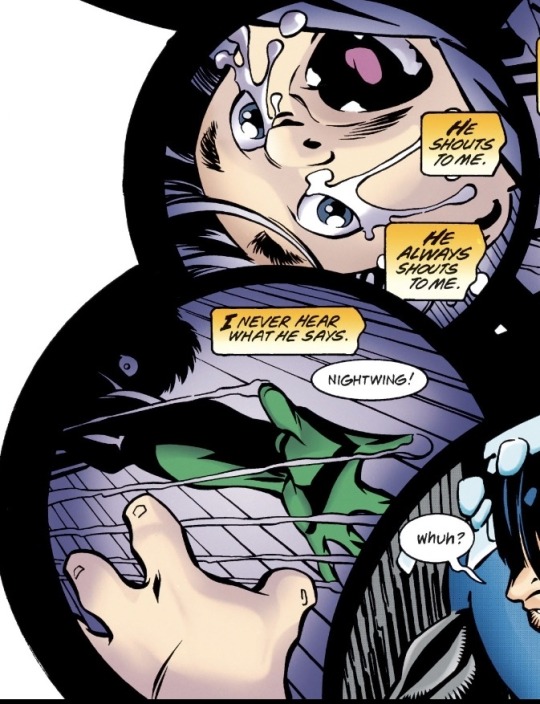

(Nightwing #6, Nightwing #146)
Nightwing catches the baby and is able to hand him to his mother. Wu Mei-Xin has never held any of her children before, it’s a lovely moment. It really caps off the growth Dick goes through over his solo.
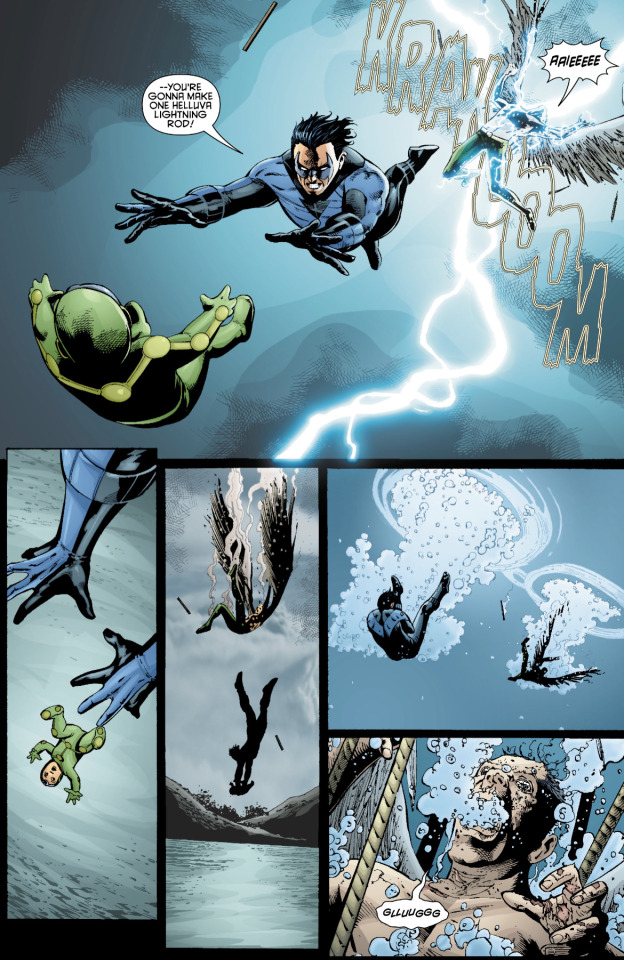
(Nightwing #146)
And similarly, Dick being there to catch Tim is important imagery in their relationship.
Dick catches Tim when they’re playing around, train surfing:
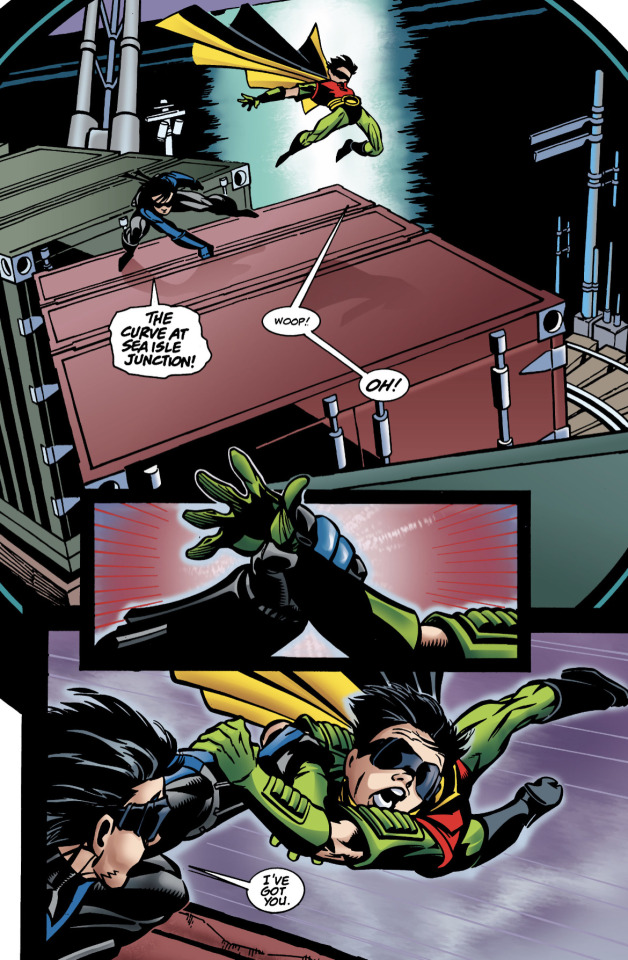
(Nightwing #25)
Dick ‘catches’ Tim when he’s depressed. “You’re not catching me at a bad time”.
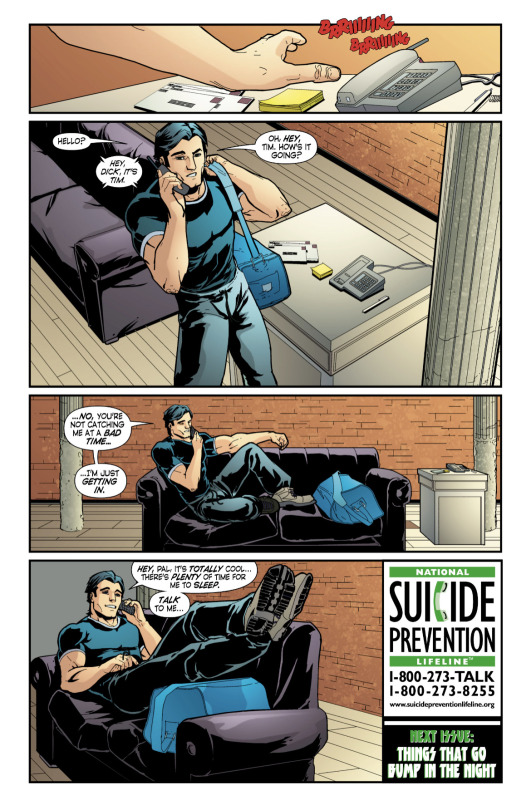
(Robin #156)
Dick is there to catch Tim as he falls apart after pouring out the water from the Lazarus pit.

(Nightwing #139)
And Dick is there to catch Tim as he falls from a building.

(Red Robin #12)
Dick’s grasp has never missed, when it’s Tim. It’s IMPORTANT to Dick that he make the catch for anyone, when they’re falling in front of him, but it’s especially important to him when it’s a child (and when it’s his baby brother).
Tim can honestly say to Dick “you’ll always be there for me” because a little part of him, deep inside, trusts that no matter what, no matter how impossible it might seem, Dick will be there to catch him.
#YEAH red robin is VERY intentional with imagery and callbacks and this is such a great moment ;_;#i think mmm how to put this#a lot of the subtext of red robin is about dick not catching tim / tim not having faith that he would#he isn't there for tim at the start of the story and he's initially pretty wary/reluctant in collision#but he comes through at the end and the end is what counts#and that's why i find it so satisfying#because dick's a character who's high-key obsessed with failure and with failing loved ones#and he very much /is/ failing tim at the start of the story in that he's not being the person tim needs him to be#but that's okay!! he can fail and it's okay!! because he does care and his heart is in the right place and he comes through in the end#so at the end of rr 12 he saves tim which is what tim needs#and tim tells him that he did everything perfectly which is what dick needs to hear#just like in resurrection when dick says all the wrong things first before he figures out the right thing to do#and - negativity alert but - i just find these sorts of stories so much more satisfying than the way taylor writes dick nowadays#where he's just chipperly incapable of any meaningful failure and wanders around being effortlessly perfect all the time#older comics let characters be bad at things and screw up and not say the right thing sometimes#and it makes the triumphant moments like the hug at the end of resurrection or the catch at the end of rr12 hit so much harder#and it's also!!!! thematic!!!! because it mimics the tension of the fall and then the catch!!!!#and dick and tim had lots of good stories like this that balanced both the tension and the love#and i really miss that for them#i feel like so much of this dawn-of-the-dcu stuff involves squashing dick into a very boring stepford-smiley figure#but like... i didn't get attached to dick because i wanted him to be a perfect plastic saint incapable of failure#i like him because he's relatable and tries hard and fails sometimes and keeps trying anyway#and the catches that he /does/ make are more important than the ones he misses <3
2K notes
·
View notes
Text
Types Of Writer’s Block (And How To Fix Them)
1. High inspiration, low motivation. You have so many ideas to write, but you just don’t have the motivation to actually get them down, and even if you can make yourself start writing it you’ll often find yourself getting distracted or disengaged in favour of imagining everything playing out
Try just bullet pointing the ideas you have instead of writing them properly, especially if you won’t remember it afterwards if you don’t. At least you’ll have the ideas ready to use when you have the motivation later on
2. Low inspiration, high motivation. You’re all prepared, you’re so pumped to write, you open your document aaaaand… three hours later, that cursor is still blinking at the top of a blank page
RIP pantsers but this is where plotting wins out; refer back to your plans and figure out where to go from here. You can also use your bullet points from the last point if this is applicable
3. No inspiration, no motivation. You don’t have any ideas, you don’t feel like writing, all in all everything is just sucky when you think about it
Make a deal with yourself; usually when I’m feeling this way I can tell myself “Okay, just write anyway for ten minutes and after that, if you really want to stop, you can stop” and then once my ten minutes is up I’ve often found my flow. Just remember that, if you still don’t want to keep writing after your ten minutes is up, don’t keep writing anyway and break your deal - it’ll be harder to make deals with yourself in future if your brain knows you don’t honour them
4. Can’t bridge the gap. When you’re stuck on this one sentence/paragraph that you just don’t know how to progress through. Until you figure it out, productivity has slowed to a halt
Mark it up, bullet point what you want to happen here, then move on. A lot of people don’t know how to keep writing after skipping a part because they don’t know exactly what happened to lead up to this moment - but you have a general idea just like you do for everything else you’re writing, and that’s enough. Just keep it generic and know you can go back to edit later, at the same time as when you’re filling in the blank. It’ll give editing you a clear purpose, if nothing else
5. Perfectionism and self-doubt. You don’t think your writing is perfect first time, so you struggle to accept that it’s anything better than a total failure. Whether or not you’re aware of the fact that this is an unrealistic standard makes no difference
Perfection is stagnant. If you write the perfect story, which would require you to turn a good story into something objective rather than subjective, then after that you’d never write again, because nothing will ever meet that standard again. That or you would only ever write the same kind of stories over and over, never growing or developing as a writer. If you’re looking back on your writing and saying “This is so bad, I hate it”, that’s generally a good thing; it means you’ve grown and improved. Maybe your current writing isn’t bad, if just matched your skill level at the time, and since then you’re able to maintain a higher standard since you’ve learned more about your craft as time went on
#writing#writers#writeblr#bookblr#book#writers on tumblr#writerscommunity#writers of tumblr#writer#how to write#on writing#creative writing#writers block#write#writing tips#writers and poets#writblr#female writers#queer writers#writer things#writer stuff#writing is hard#writing advice#writing life#writer problems#writerscreed#writersnetwork#writerblr#writersociety#writerslife
6K notes
·
View notes
Text
“They finally made this theme more blatant-" Why does it need to be blatant. What's wrong with subtlety? Concepts can be underused but subtlety is not neglect.
Blaring all your concepts and themes is not good writing. It's so disruptive to a story's flow when the characters look off the screen to be like "See? This is the concept. The idea. The theme."
If you can feel the hand of the author becoming too heavy that's bad.
For example: I see people saying Azula's abuse in ATLA is more blatant in the live action and it's good because "it's being discussed more". It already was discussed at length. The show made it clear she was a victim at every turn, every behavior, every reaction, it came from a place of trauma. It was made clear that she was scared of ending up like Zuko because Zuko was an example of what would happen to her if she failed. When she says she's better than Zuko it wasn't just because she was raised to think hersef superior to him but because Zuko failed and failures get mutilated and exiled, failures are abandoned. In that final Agni Kai the music is morose and somber because this isnt some epic battle its a fucking tragedy, the burning out of "Ozai's brightest light" and Azula finally succumbing to her terror and trauma she was repressing now that her worst fears are realized. How can you see a fourteen year old girl chained to a sewer grate wailing and writhing and breathing fire desperately as unsympathetic? Even Katara and Zuko are horrified as to what has become of her.
The writers weren't looking us in the eye and saying "See? She's a victim too" when they wrote this, they weaved it in. They weaved it into her obsesison with symmetry, her extreme perfectionism, the way she talks about Ozai, the ways she calls herself a monster, her isolation from those with healthy home lives, all the ways she held herself together and ultimately all the cracks and seams that she shattered down when she fell apart. It did not need to be blatant to be clear.
#Finis Analyzes#Nihil Dreams#ATLA#avatar the last airbender#Azula#I’m so fucking sick of people saying stuff like this#Please learn media literacy I am begging you#The narrative is not going to hold your hand and play tour guide and point out everything#Stop acting like it has to#You can analyze it yourself I promise
4K notes
·
View notes
Text
Actually, when I think about it, in the context of most traditional challenge-based TTRPGs (your Calls of Cthulhu, Dungeonses & Dragonses, and Rolesmaster) "no consequences for failure" doesn't really track as a system criticism but more as an adventure design issue. Okay, it's also a bit of a system issue, but I digress.
In most official Call of Cthulhu and Delta Green scenarios I've read the authors seem to consider their story a bit too precious not to have it happen, so they build a bunch of fail-safes to make sure that the investigators get funneled towards some kind of satisfying outcome, which comes off as feeling very inorganic. And I don't necessarily mean fail-safes like "multiple paths of clues to follow," instead I mean "if the investigators are struggling with finding information let them make IDEA or LUCK rolls!"
This same is true of D&D adventure design starting already in the early eighties but really coming to fore in the AD&D 2e era. Some of AD&D 2e's adventure modules are the absolute dregs in this regard, with the player characters literally as spectators to a linear succession of events that have a great effect on the metaplot, and with combat encounters sprinkled in. It's not even that without the player characters the story won't happen, it's that without the player characters there will be no one to watch the actual story happen. (This is a good campaign design question by the way: are you writing a campaign where the player characters are always reacting, always running after the bad guys who have already done a bad deed, always rushing to prevent a bad thing from being done, or are the player characters actual agents causing things to happen in the world?)
But anyway, that's not great. The mystery that has to be solved or the player characters won't get to see the exciting climax or the caravan moving through a series of plot points will make failure feel bad, because within that kind of adventure design failure can only ever feel like "the player characters must take a scenic route to victory."
But it actually is possible to have an adventure which accommodates for failure even when mechanically failure itself only means "the character didn't do the thing." It's the character-driven challenge game, best exemplified by the dungeon crawl.
"How do I make sure the characters find all the clues" becomes a non-issue once you accept that they might not find all the clues and the consequences of that can be as interesting as finding all the clues. "What if this fight is too hard" well then the characters can choose not to engage, and if they do engage and find it too difficult they can retreat.
364 notes
·
View notes
Text
Let's delve into...
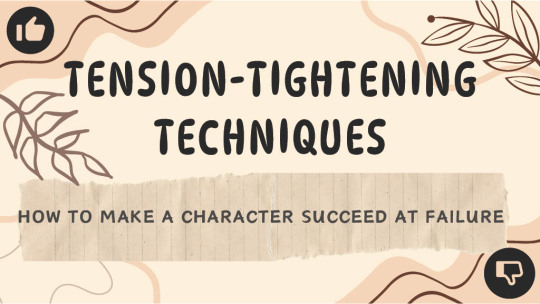
Look, I know you don't like to fail. I KNOW. Neither do I. But do you know who will—and should—fail a lot? YES, your characters! Failure does all the nifty things writing teachers promise us will keep the story interesting: raise the stakes, bring emotions to a boil, and keep things from stagnating and/or getting predictable. Triumphs have their place, and should be present (unless you enjoy metaphorically kicking your readers in the shins, which, hey, more power to you!) but your characters can't always win. That's boring, and unfortunately, boring is the biggest noncriminal sin in entertainment. The good news is that, when your character does win, their previous failure is going to make it all the more satisfying. Doesn't that make you want to nail that failure for maximum improvability? (Hey I HEARD YOU rolling your eyes just now. Rhetorical questions are NOT cringe. Rude.)
So, what do I mean by a "good failure"?
Basically, when they mess up naturally, because of their own choices, in a way that reflects their flaws. "But wait," I hear you say, "does that exclude the possibility of an external circumstance making for a good catalysts for failure?" Nope! There are no hard and fast rules in writing, and shit does, indeed, just happen sometimes. Happen poignantly, even. But your character can't be entirely blameless in every scenario because then things get *taps on chalkboard* BORING. Seriously, consequences are so cool, I promise.
Okay then, why do I want a good failure?
Emotional resonance: do you remember that time you studied hard and still failed the test? Betcha that felt real bad. Yeah, it's that, but magnified by however many people died (or were sad about it! The stakes don't always need to be cataclysmic).
Catalyst for organic growth: do you remember how failing that test made you decide never to pull an all-nighter cramming again? Perhaps even reassess your relationship with God, your identity, and your place in the universe? Yep. And it felt earned, too. Huh.
Narrative depth: how mad were your parents about that test? And how much did it suck getting your Nintendo taken away because of it? That was compelling, realistic tension, baby! It put you right on the—unfun, but necessary—path to making that eventual success feel meaningful. Yay.
Relatability: you know, I felt kinda bad writing all that stuff about how failing that test wrecked you. Because I have empathy, certainly, but also because I've been there too! Mistakes are human, and few things are more effective at humanizing someone than making them an honorary cringefail loser. (This holds especially true if they're usually the god king of being hot and correct, btw.)
Fine, so how do I go about writing that?
Foreshadowing: why, yes, everything DOES always come back to foreshadowing. Good catch! See, foreshadowing marks the difference between a failure being contrived and awkward, and landing because it was tragically inevitable. The character has been making bad decisions that will come back to bite them all book, and the time for gleaning lessons from the teeth marks on their ass is now.
Make the failure specific and personal: sure, failing a test is a universal experience, but failing the most important test ever conceived in the history of mankind and if you fail your mom will hate you and your girlfriend will leave you and you'll go bald isn't. Make 'em feel it where it hurts!
Consequences: internal or external, they better be tailormade to catalyze change. Be it damaged interpersonal relationships or crippling self-doubt, they better not walk away from their mess-up willing to do it again. (NOTE: exceptions may apply in negative character arcs, but even then, the next time they make that mistake, it shouldn't be the exact same one again. It should be so, so much worse.)
Redemption: following on from the last point—make it a turning point! Show me how things are fifty kinds of broken now and how your character plans on rebuilding the mess using the tools they just got from chucking the toolbox full-tilt at their lives.
Examples be upon ye:
Simba in The Lion King: hopefully we can all agree that thinking you caused your father's death is a valid reason to crash out. However, the important thing here is that the crash-out was not eternal. It allowed for an emotional development cooldown period, and when it did end, empowered Simba to make his triumphant return all the more triumphant. Do you think smacking his geriatric uncle off a mountain would've been half as hot if his emotional arc and subsequent redemption had been underbaked? No. Literally. C'mon, lock in.
Zuko in Avatar: The Last Airbender: ahh yes, the king of redemption arcs, which kinda also makes him the king of cringefailing (both externally and internally! Very illustrative, thank you, Zuko). But I bet you don't just remember his struggle with capturing Aang. In fact, I'd bet quite a few buckaroos what you most remember is his struggle with honor. Could it be because you're grateful for what each setback did to help him find his? What about how they taught him that true honor was internally cultivated rather than externally conferred? And the fact that he chose to help the person whom he'd vowed to destroy in order to get it, for which he used the tools he painstakingly won throughout his arc? Hmm. Perchance. See what I mean? It just feels right when things come full circle, and boy is a good failure shaped like zero!
Ultimately, I hope you found something useful here and that, the next time you're down in the trenches of narrative predictability and character stagnation, you consider pissing in their metaphorical coffees. Thank you!
Happy writing!
224 notes
·
View notes
Text
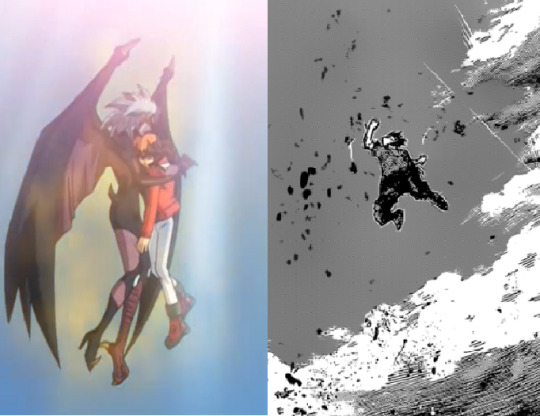
SHIGARAKI VS. YUBEL: HOW TO SAVE YOUR VILLAIN
The failure of Deku to save Shigaraki isn’t just a tragic conclusion for Shigaraki’s arc, it’s also My Hero Academia failing as a story. When I say the story failed, I mean the story has failed to answer any of the questions it asked its audience. It’s themes, character arcs, everything that communicates the meaning of the story to the audience is no longer clear.
Saving Shigaraki was the central goal of not only the story itself, but the main character Deku. By failing in its goal you can’t call this a good ending. In order to illustrate why this goal of saving the villain is so important to both Deku’s character and the central idea of MHA, I’m going to provide a positive example in Yu-Gi-Oh GX were the main character Judai successfully saves their villain. One of these stories fails, and the other succeeds. I will illustrate why under the cut.
BROKEN THEMES = BROKEN STORY
When artists draw they have to consider things like perspective, anatomy, shading, light, coloring. Drawing has rules, and it’s hard to produce good art without knowing these rules beforehand. If I draw something that has bad anatomy, you can criticize me for that.
Writing has rules, just like drawing. The rules of storytelling are important because writing is an act of communication. You can write whatever you want, just like how you can draw whatever you want, but if you break the rules the audience won’t understand what you are trying to communicate.
When I refer to MHA as a broken story, I am referring to the fact that it has broken the rules of storytelling. As this youtuber explains.
“I guess we should first define what broke and broken even means in this context. Has the story turned into an unintelligible mess? Not really. Value judgements aside, the narrative is still functional and fulfills the criteria of being a story. So how can a story that still functions be broken? Maybe to you it cannot. But to me a story that is still functional isn’t enough. What I mean when I say MHA is broken is that it’s lost something crucial. A codifying style of structure, pacing and payoff that until a certain point was the core of its identity.”
I could launch into a long-winded explanation of what themes are, but for the sake of simplicity I like to define themes in terms of “Ask, and answer.” The author asks a question to the audience, and then by the end of the story provides an answer. The audience is also invited to come up with their own answer which prompts them to think about the story on a deeper level. The question both MHA and GX are asking both its main characters and the audience is “Can you save the villain?” with the additional complicated question of “Should you save the villain?” This post will detail how both stories go about answering those two questions, and more importantly why those answers matter for the story.
With Great Power… You know the rest.
My Hero Academia and Yu-Gi-Oh Gx are actually similar stories once you get past their superficial differences. MHA is a story with way better worldbuilding, compared to a society where everything revolves around the trading card game, and people go to school to be better at a trading card game.
However, if you get past that. They are both bildungsroman, stories about the main characters growing up into adults. They both have an academy setting where the goal is for the main character to graduate and enter the adult world. They are both shonen manga. GX is the sequel of Yu-Gi-Oh a manga that ran in Shonen Jump the exact same magazine as MHA. The biggest point of comparison is their main characters, who both start out as young and naive who are driven by their admiration of heroes. Deku is a fan of All Might who wants to become a hero despite not having a quirk, because he loves All might who saves everyone with a smile. Judai’s entire deck archetype revolves around “Elemental Heroes’ and later “Neo-Spacians” who are all based on popular sentai heroes like ultraman.
The central arc for both characters is to grow up. Growing up for both of them not only requires figuring out what kind of adult they want to be, but also what kind of hero they want to be.
Now I’m going to drastically oversimplify what a character arc is.
A character arc first starts out with the character being wrong. Being wrong is essential because if the character is right from the beginning, then there’s no point in telling the story. A character often holds the wrong idea about the world, or has some sort of flaw that hinders their growth. The narrative then needs to challenge them on that flaw. It usually sets up some kind of goal or win condition. That flaw gets in the way of a character “winning” or achieving their goal, so they need to fix that flaw first. If their ideals are wrong, then they need to think about what the right ideals are. If they’re too childish, they need to grow up. If they have unhealthy behaviors or coping mechanisms, they need to unlearn it and require better ones. Otherwise, that flaw will keep sabotaging them until the end.
I’m borrowing the word “win condition” from class1akids here because it’s an incredibly appropriate terminology. Midoriya needs to do “x” in order to win, otherwise this victory doesn’t feel earned. The “x” in this case is usually character development. As I said before, a story where the main character hasn’t changed from beginning to end feels pointless. Especially in Deku’s case, he was already a brave, strong hero who would charge right into battle and defeat the bad guys in chapter one, so him defeating Shigaraki in a fist fight doesn’t represent a change.
The story sets up not only “What does the hero need to do to win?” but also “How does the hero need to change in order to win?” A character either meets these requirements before the end of the story, or they don’t and usually this results in a negative ending.
MHA in its first half quite clearly set up both the final conflict of saving the villains, and also that saving the villains is its “win conditions.” The hero shouldn't be allowed to win without first fixing this flaw.
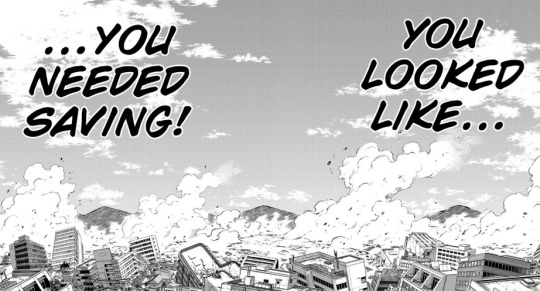
From this panel onward the central question Deku is forced to answer shifts from “Am I strong enough to defeat ShigarakI” to “Can I save Shigaraki?” However, much earlier than that All Might goes on to basically set up the win conditions of what makes the ultimate hero as someone who “Saves by winning, and wins by saving.”
All might: You can become the ultimate heroes. Ones who save by winning, and win by saving.
Therefore the story has set it’s criteria for what kind of hero Deku needs to become. If he wins without saving, then he’s failed to become what the series has set up as the Ultimate Hero.
Shigaraki and Yubel aren’t just narrative obstacles, or boss monsters to be killed like in a video game. They are narrative challenges, which means that the character can’t grow in any way if they don’t answer the challenge presented by the characters. They are villains who actively resist being saved, to provide a challenge for two heroes who define their heroism by saving others. The challenge they pose adds a third question to the story and the main characters.
"Can I save the villain?"
"Should I save the villain?"
"If I don't save the villain, then can I really call myself a hero?"
In other words the decision they make in saving, or not saving their final antagonist defines what kind of hero they are. In Deku’s case it’s even more critical he defines what hero he wants to be because the MHA is also a generational story, and several of the kids are asked to prove how exactly this generation of heroes is going to surpass the last one. The kids growing physically stronger than the last generation isn’t a satisfactory answer, Deku getting strong enough to punch Shigaraki hard is not a satisfactory answer, because we are reading a story and not watching a boxing match.
I’m going to focus on the last two questions though for a moment. Many people who argue against saving villains like Shigaraki argue he is a mass murderer and therefore isn’t worthy of salvation. However, the act of saving Shigaraki isn’t a reflection of Shigaraki himself, but rather the kind of hero Deku wants to be. It all boils down to Spiderman. In the opening issue of Spiderman, teenage Peter Parker is bitten by a radioactive spider and suddenly gains super strength, the ability to stick to walls along with other powers. However, being a teenager he uses these powers selfishly at first. He doesn’t feel the obligation to use his powers for other people, and therefore when he sees a robbery happening right in front of him he lets the robber go. However, because he lets the robber go, the robber then attempts to hijack a car and kills his Uncle Ben in the process. If Spiderman had stopped the robber then he might have prevented that from happening. He had the power to stop the robber, but he didn’t feel responsible or obligated to save other people. As a result Uncle Ben dies. It’s not enough to have power, ti’s how you use that power that reflects who you are, therefore: “with great power comes great responsibility.”
The choice to save Shigaraki actually has little to do with whether or not Shigaraki is redeemable, but rather how Deku chooses to use his power, and what he thinks he is responsible for reflects who Deku is as a person. Deku himself also clearly outlines how he wants to use his power, that One for All is a power for saving, and not killing.
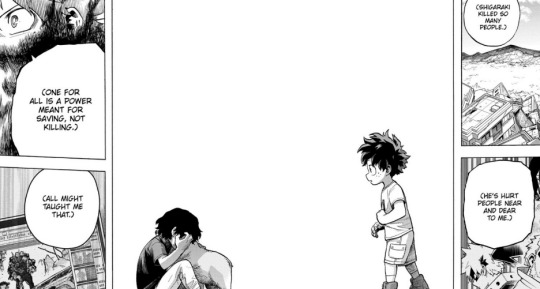
How he uses his power reflects Deku’s ideal in saving others, and therefore if he doesnt use his power to save, then he’s failed to live up to his ideals. It's not whether it's morally right to save a murderer like Shigaraki, but rather the way Deku wants to choose to use his power. It's about whether he feels the responsibility to save others.
Judai explores an incredibly similar arc to Deku. They are basically both asked what kind of responsibilities a hero is supposed to have, which is also a metaphor for growing up to handle the responsibilities of adulthood. As both characters start out with incredibly naive and childish ideas about what a hero is. Therefore realizing what a hero is responsible for is key to them growing as a character. However, Judai is different from Deku. In some ways he’s more like Bakugo. Judai is a prodigy who’s naturally good at dueling. He doesn’t duel to save others, but rather because duels are fun and he’s good at it. He’s very much like Bakugo, who admired All Might as a hero just as much as Deku did, but admired the fact that he was strong and always won rather than he saved others.
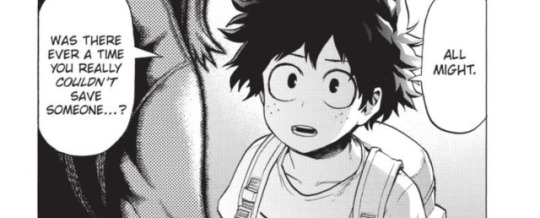
However, I would say both Deku and Judai are questioning what a hero is responsible for. They are both asking if they have the responsibility to use their power to save others. If they have to fight for other people, just because they have power. His first big challenge as a character comes from Edo Phoenix, who calls out Judai for not thinking through what it means to be a hero, and what responsibilities heroes carry. Judai duels because he thinks it’s fun. He will show up to duel to help his friends, but that’s because he’s the most powerful person in the group. Even then it’s because he finds fighting strong opponents to be enjoyable. Bakugo will beat up a villain, but for him it’s more about winning then if the action will save someone or not.
Judai is more often than not pushed into the role of being a hero, he doesn’t play the hero because he’s a particularly selfless person, and he’ll often avoid responsibility if not forced. He has power but no sense of responsibility and the narrative calls them out as a problem.
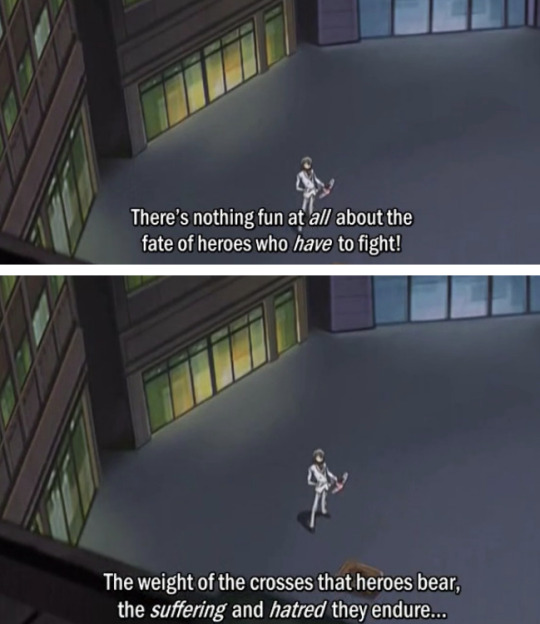
Edo: Can you even fathom that, Judai?
For Judai, he can’t understand the responsibility of being a hero. For Deku, he idealizes heroes so much he can’t understand that there are people out there the heroes have failed to save. These two callouts towards Deku and Judai are discussing similar because they’re both discussing where a hero’s responsibilities lie. Is a hero responsible for saving everyone? Is someone strong like Judai responsible for using their strength to help other people?
Judai’s arc continues into the third season where he’s not shown to just be naive but ignorant. He’s not just childish, he actively resists growing up because he doesn’t want to take on adult responsibilities.
THe same way that Deku just decides not to think about whether or not All Might failed to save people in the panels above. However, in Judai's case he's actively called out for his choice to remain ignorant.
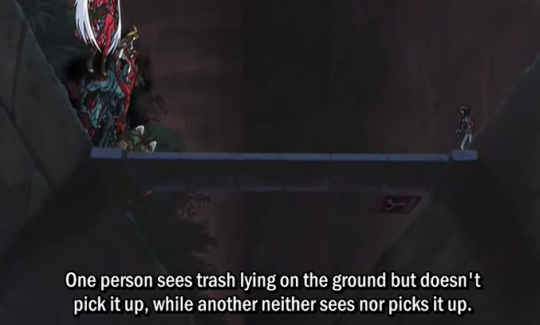
Satou: Now, which one is at fault? Judai: Isn’t it the guy who saw it, but didn’t pick it up. Satou: Not quite. If one is aware of the trash that fell, it may be picked up someday. But there is no possibility fo the unaware one ever picking it up. Judai-kun you are the foolish one unaware of the trash that has fallen. Judai: Are you calling me out for how I am? Satou: Your behavior towards me was atrocious. The worst was attending class only for credit, even if you were there you only slept. Judai: Yeah, I know. I was all bad, but it wasn’t that big a- Satou: It is important. You see, one by one, the students inspired by your attitude were losing their motivation. Now if you were a mediocre duelist, then this would not be an issue. Satou: However, you are the same hero who defeated the three mythic demons. Every single student in the academy admires you. You should have been a model for this academy. Judai: Me, a role model? Are you kidding? I just do whatever I feel like doing. Satou: Great power comes with great responsibility. Yet, as you remain unaware of that, you’ve spread your lethargy and self-indulgence.
seems like a minor issue, but look how Judai responds to the accusations. “I just do whatever I feel like doing.” Satou is arguing that Judai should pay attention to the influence he has on others because of his power, because how he chooses to use that power affects others. However, Judai chooses to actively not look at the consequences of his actions because he doesn’t want to take on that level of responsibility, and therefore he’s looking away from the trash.
While it seems like it doesn’t matter in Satou’s specific example, not thinking of the consequences, or how you use your power can have unexpected consequences. Spiderman doesn’t feel like it’s his responsibility to stop a bank robber, and that bank robber shoots his uncle. You could still argue it’s not Spiderman’s responsibility to stop every crime in the world, and I guess no one owes anyone anything from that point of view - but Spiderman failing to act responsibility had the consequence of directly hurting someone else.
Spiderman has to live with that consequence because it was his own Uncle that was hurt. This is where we really reach the duality of Judai.
In GX, Judai is, symbolically speaking, The Fool of the Tarot Deck, the Novice Alchemist — a person brimming with infinite potential, yet one who is also supremely ignorant, who walks forward with his eyes closed and often unknowingly causes harm in his great ignorance. In this, he is very much the embodiment of the faults we most commonly associate with teenagers — selfishness, recklessness, shallowness, a lack of dedication or empathy when it’s most needed. Like most people, he has good traits that work to balance out some of the above, but his narrative path through GX ends up being that of the flawed hero undone by his faults — and then that of the atoner, the repentant sinner. In his case, the mistakes of his teenage years are the catalyst for his growth from a boy into a man burdened with duty and purpose. Judai is someone with infinite potential, with great power, but also ignorant on how he should use that power, and that makes him an incredibly flawed hero who needs to learn how that power should be used.
Deku similarly exists in a society where heroes deliberately turn a blind eye to the suffering of a certain type of victim. Shigaraki’s speech heavily resmebles Satou’s speech about garbage on the side of the road.
Shigarali: "For generations you pretended not to see those you coudln't protect and swept their pain under the rug. It's tainted everything you've built."
Deku shares Judai’s ignorance, because he’s not only a part of a system that doesn’t even see trash on the side of the road, but he also worships heroes so much that he’s incapable of criticizing them. If Deku saw the flaws of heroes, but at first didn’t have the courage to speak out, but eventually gained the courage that would be one thing. However, if he doesn’t see the flaws of heroes, then the problem will never be fixed.
There are also consequences for both Judai and Deku failing to use their powers responsibly. These consequences take the form of the villains who came about because of all of society’s ignorance to the suffering of victims (Shigaraki) and because of the main character’s ignorance to their suffering (Yubel). Shigaraki and Yubel are also explicitly victims that the heroes failed to save, turned into villains who are active threats to the heroes.
Should I save the villain?
The answer is yes, because the decision to save is reflective of the kind of hero each character wants to be. Each story clearly sets up that Deku and Judai aren’t punisher style heroes who shoot their villains, they are being set up as heroes who save. Deku needs to “save by winning.” As for Judai, a big deal is made of Judai’s admiration for another character Johan who represents a more idealistic kind of hero. Johan unlike Judai is someone who duels with a purpose, something Judai outright says he admires because he’s empty in comparison.
Judai: Johan what have you been dueling for? See, it’s about fun for me… Well, for the surprise and happiness too. I guess I do do it for the fun. Sorry, I guess I put you on the spot by asking out of nowhere. Johan: What’s this about Judai? Judai: It’s nothing. Johan: I suppose there is one goal I have. Johan: Even if someone doesn’t have the power to see spirits, they can still form a bond with a spirit. That’s why I do it for people like him. [...] Johan: I'll fight for everyone who believes in me, and I'll do it with my Duel Monsters. Judai: I'm jealous you've got feelings like those in you.
Becoming a hero who uses their power to help others isn’t just a goal the story sets for Judai, it’s a goal that Judai sets for himself because of his admiration for Johan. Johan represents the idealistic hero Judai wants to be, but is also held back from because of his personality flaws. Johan represents the kind of heroic ideal that Deku is aspiring to be.
Johan’s ultimate goal isn’t punishing the wicked, but to use his power to save others.
Johan: Judai, it was my dream to save everyone through my dueling!
The story sets up the idea that it’s not enough for Judai to simply be strong, he’s also challenged to become a savior who uses his power to help others like Johan. Deku needs to “save by winning” and Judai needs to “Save everyone through his dueling.” However, Johan also adds another condition to what saving means. His idea of saving isn’t to defeat a villain, but rather his dream is to help connect spirits and humans together, even if there are humans who can’t see spirits. Johan doesn’t save people with the power of physical force, but rather the power of human connection.
Should I save the villain?
Here the answer is "Yes", because wants to become more like Johan someone who uses their power to help others not just for themselves. Then we reach the third question
If I don't save the villain, can I really call myself a hero?
It once again comes to power and responsibility. Heroes have great power, and they are responsible in how they use that power, if they use it irresponsibly then there are consequences. Shigaraki wants to destroy hero society, because the heroes irresponsibly use their power to turn a blind eye to everyone’s suffering.
People suffer when heroes fail to live up to their responsibilities. The entire conflict of season 3 is created by Judai failing to save Yubel. If Judai had helped Yubel when they most needed it, instead of abandoning them, then Yubel would never have been twisted by the light of destruction, would never have attempted to teleport the school to another dimension, would never have attacked all of JUdai’s friends.
These consequences matter. Deku can turn his eyes away from Shigaraki’s suffering, but let’s say a hero failed to stop a robbery, or rather he didn’t even try, and because of that his mom was shot and died in the street. Would Deku consider the man who failed to stop a bank robbery a hero? When Spiderman let a bank robber go instead of trying to stop him, was he being a hero in that moment? Both the stories and the characters themselves have defined heroes as people who use their powers to save others, therefore if Judai and Yubel fail to save their villains then they can’t be called heroes by the story’s own definition. Now let’s finally return to the question of "Can I save the villain?"
Was there ever someone you couldn’t save?
m going to start with Yu-Gi-Oh Gx as a positive example of how to save your villain. Gx works for two reasons. One, it’s established from the start that Yubel isn’t beyond salvation, and two, it makes it so Judai can’t win without saving Yubel. The conflict of the story does not end until Judai makes the decision to save Yubel. In some ways the writing is even stronger because Judai is directly responsible for the pain and suffering that Yubel went through that turned them into a villain in the first place. Yubel isn’t just a victim, they’re specifically Judai’s victim.
Yubel is a duel spirit who is also essentially Judai’s childhood friend. A duel spirit just like the kind that Johan wants to save. During their childhood Yubel got too overprotective of Judai, and started to curse his friends for making him cry or upsetting him in any way. Until everyone Judai’s age started avoiding him and Judai became all alone with only Yubel for company. Judai’s decision was to abandon Yubel at that time. He took the yubel card and shot them into space, hoping that being bathed in space rays will somehow “fix” what was wrong with them. I know that’s silly but just go with it. Judai abandoning Yubel had the unintended consequence of Yubel being subjected to the light of destruction, a corrupting light that subjected Yubel to years of pain. This pain literally takes the form of Yubel burning alive.
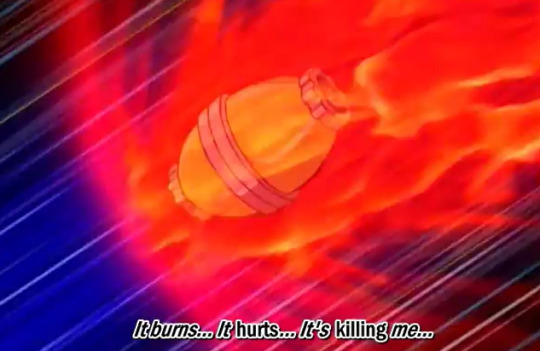
Yubel connected to his dreams called out for Judai every night, only for Judai’s parents to give him surgery that repressed his memories of Yubel causing him to forget them entirely. Yubel then spent the next ten years alone in space, continuously subjected to painful torture, with their cries for help being ignored.
"I was suffering even as you came to forget about me..."
Yubel is then met with the question of how can Judai treat them this way if they loved him so much? As from Yubel’s perspective, they’ve only ever tried to protect Judai, only for Judai to not only throw them away, but subject them to painful torture and ignore their cries for help. Judai effectively moves on with his life, goes to duel academy, makes friends while Yubel is left to suffer in silence all but forgotten. This is where Judai’s ignorance has serious plot consequences.
It’s not just the pain that Yubel endured that made them snap. It’s that their pain went ignored.
Yubel holds out the faint hope that Judai will answer their calls fro help until they finally burn up upon re-entry into earth’s orbit. At which point they’re left as nothing more than a single hand crawling on the ground. Yubel who cannot fathom why Judai would cause them so much pain, and then forget about them, convinces themselves that Judai must be causing them pain, BECAUSE he loves them.
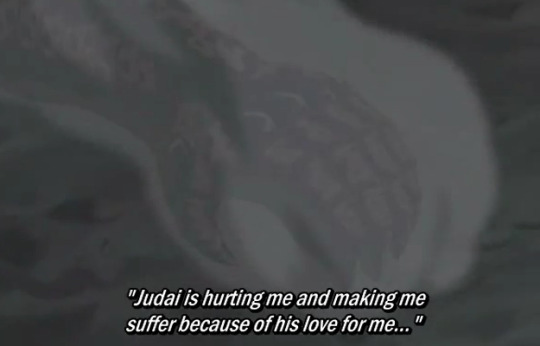
But you see, I couldn't possibly forget about you in the time that I've suffered...
Judai is allowed to move on with his life, to make friends, to spend the next ten years doing so while Yubel is subjected to ten years of agony. When they finally escape their painful torment, they see all the friends Judai has made while they’re left alone and forgotten. However, Yubel’s goal isn’t revenge. Rather, it’s to make Judai share and recognize their pain. WHich is why I said it’s not the fact that they were made to suffer, but their suffering is ignored. Yubel’s entire philosophy revolves around the idea that sharing pain is an expression of love, and that they and Judai share their love for each other by hurting each other.
"That's why I sought to fill all those linked to you, your world, with both sadness and anguish..."
For Yubel, making all of Judai’s friends suffer and Judai themselves suffer is a way of making them and Judai equals again. They want to show “their love” for Judai, but it’s more about forcing Judai to recognize the pain he’s caused them by forcing him through the same pain. Yubel’s philosophy of sharing pain is actually a twisted form of empathy.
They’re not entirely wrong either, that even people who love each other can cause each other pain, and that if one person is suffering alone in a relationship or the suffering is one-sided then there’s something wrong with that relationship.
Yubel: I get it now… You weren’t in love, with Echo. Yubel: No.. you may have loved her just enough to clear the conditions in palace for you to control Exodia, but the you didn’t truly love each other. Yubel: You were only unfairly hurting her, while you stayed unharmed. You wouldn’t suffer. You wouldn’t suffer. You wouldn’t be in pain. Amon: What are you getting at? Yubel: I’ve been hurt! I’ve suffered! I’ve been in pain. That’s why I’m making JUdai feel the same things I did!
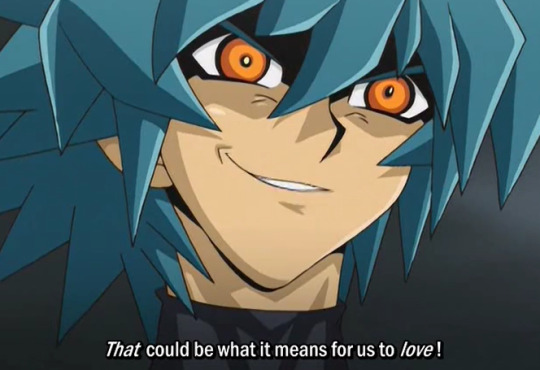
Yubel’s twisted theory of love, is a pretty thinly veiled cry for empathy.
They break out into tears when talking to Amon about the way they’ve hurt and suffered. They clearly state upfront that their goal is for Judai to recognize their love. One of the first things they say to Judai is a plea for Judai to remember them.
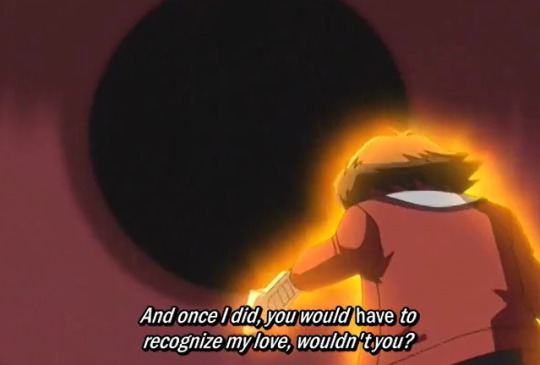
Yubel is presented as a very human character suffering through a lot of pain throughout their entire villai arc, they break down into tears multiple times, they cry out in agony, they're visibly suffering and you see their mental walls begin to break down when Judai denies them any empathy.
Yubel is actually incredibly clear and straightforward about their desire to be saved by Judai. However, Judai doesn’t lift a single finger to help Yubel the entire arc, even though they themselves admit they are directly responsible for Yubel’s suffering but they helped create who they are today.
Judai plunges into a different dimension and gives up everything to save someone, but it’s Johan, not Yubel they try to save. You have Johan, the perfect friend, and perfect victim that Judai gets obsessed over and will not stop at anything to save, and then you have Yubel, the imperfect victim that is actively harming Judai and all of his friends that Judai chooses to ignore. The whole season Judai only focuses on saving the perfect victim Johan, and this is clearly shown to be a flaw. Judai doesn’t just ignore Yubel to save Johan, he also ignores every single one of his friends.
Judai only caring about saving Johan, and deliberately ignoring and abandoning the friends who came with him to help, essentially abandoning them the way he did Yubel leads to another consequence. After he abandons them they get captured, rounded up, and actually die and become human sacrifices.
Losing his friends, causes Judai to snap. Judai becomes the supreme king and decides power is all that matters; he starts killing duel spirits en masse in order to forge the super polymerization card. Which means being left alone, suffering alone, being abandoned by everyone causes Judai to snap the exact same way that Yubel did.
In fact Judai is only saved from his darkest moment, because two of his friends sacrifice their lives, trying to get through to him and appeal to his humanity. At that point Judai’s friends could have just chosen to put him down like a mad dog, to punish him for the amount of people he’s killed, but instead they try to save him because of their friendship.
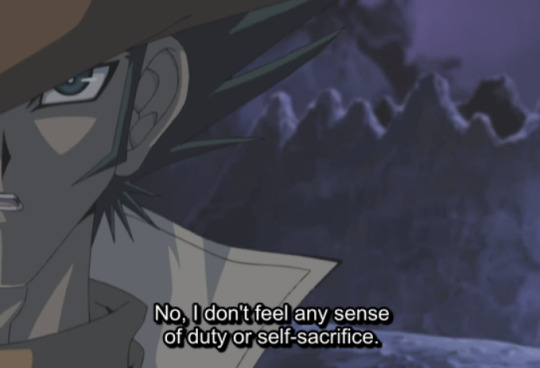
I just want to save my friend. That is all.
By the time Judai is facing Yubel in their final fight, Judai doesn’t have the moral highground against Yubel in any way whatsoever. They’ve both lashed out because of the pain they endured and killed countless people in the process of lashing out. The only real difference between them is that Judai is lucky. He had friends to support him at his lowest point, while Yubel didn’t. Does Judai learn from Jim’s example, and go out of their way to save Yubel the same way they were saved because Yubel is still a friend? Nope, Judai tries to kill Yubel at this point.
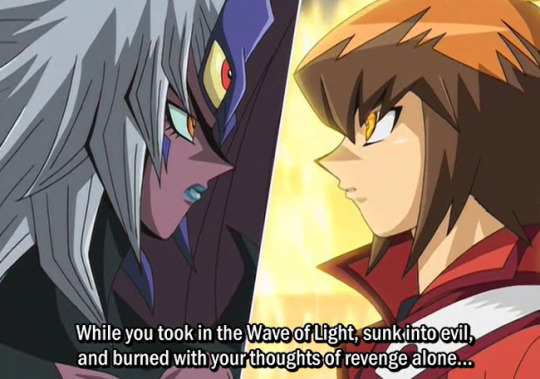
I made a lot of friends... And they all taught me something… real love is wide enough, large enough and deep enough to fill the universe. Your so-called love is only a conceited delusion.
Like, Judai, sweetie baby honey darling. How was Yubel supposed to make friends when they were floating in the empty void of space?
Judai hasn’t learned, they are still ignorant, and still turn a blind eye to Yubel’s suffering. After all if his love is wide enough, large enough,and deep enough to fill the universe then why don’t thy have any room in their heart whatsoever for empathizing with Yubel?
Judai making friends while Yubel was trapped in space doesn’t make Judai a better person than Yubel, it makes Judai lucky. Judai doesn’t even appreciate that luck, because he treats his friends like garbage. It’s not about whether Yubel is worthy of salvation, because Judai is a mass murderer and his friends still went to great lengths to save them anyway. It’s that Judai doesn’t want to empathize with Yubel, because they still want to remain ignorant and irresponsible. Judai wants to continue playing hero, with a very black and white definition of what a hero is. By this point Judai’s killed lots of people, but if he makes Yubel the villain in the situation, he can keep playing hero. He doesn’t have to look at himself and what he’s done, because blaming everything that happened on Yubel and then putting Yubel down like a mad dog allows Judai to absolve his own guilt. Judai practically ignores Yubel’s cries for help, even when Yubel spells it out for them.

I couldn't have lived with the heartache unless I felt that I was being loved...
At this point Yubel themselves acknowledges that their love was just a delusion. That it was a coping mechanism, because they couldn’t live with all the pain otherwise. WIthout it they would have just died, which makes Judai unmoved. The implication here is that Judai thinks yes, Yubel should have just died in that crater. It would have been easier for Yubel to die a perfect victim, then for Yubel to crawl out of that crater and go on to hurt other people. While that may be true the same can be said for Judai - it would have been better if Judai died rather than become the Supreme King. His friends could have put him down like a mad dog, you could have even called that justice - but they didn’t. Judai making no attempt to save Yubel isn’t because he thinks it’s morally wrong to save someone who’s killed as many people as Yubel has, or because he thinks he can’t forgive Yubel, it’s because Judai is taking the easy way out. Johan is a nice, easy victim to save, because he’s Judai’s perfect boyfriend, while Yubel is a complex victim that requires Judai to understand their suffering. Even the act of saving Johan isn’t about Johan himself, it’s about the fact that Judai feels guilt over Johan’s disappearance. What Judai wants isn’t really to save a friend, but to stop feeling guilty over that friend. Judai isn’t just disgusted by Yubel’s actions towards his friend, he also wants to avoid the guilt he feels over causing all of Yubel’s suffering, because it requires acknowledging the complex reality that he is both victim and perpretrator in this case, just as Yubel is both victim and perpetrator.
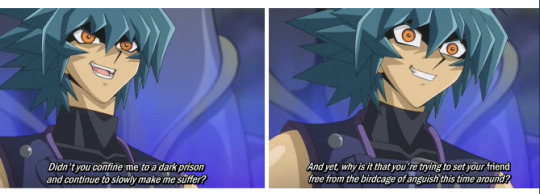
So how can an arc where Judai doesn’t try to save Yubel until the last possible minute, be better than an arc where Deku makes it his goal for the final act of the manga to save the crying boy in Shigaraki?
It’s because the story does not let Judai get away with his continual refusal to empathize with Yubel. Yubel’s entire character revolves around empathy, in the form of sharing pain. As a duel monster, Yubel’s effect is that they are a 0/0 attack monster who is immune to all damage, but when you attack them they deal all the damage back to you. Which means that Yubel will respond to all the pain they feel, by causing you just as much pain in return. Yubel is not a character who can be defeated in a fight, or a duel. In fact they’re the only Yu-Gi-Oh villain who never loses a duel once. The most Judai can do is duel them to a draw, and they draw three times. Yubel wins against everyone else who challenges them. In a way Yubel is like Shigaraki, the ultimate, unkillable enemy that can’t be done away with violence. Judai’s refusal to empathize with Yubel or attempt communication also makes them worse, every time Yubel is hurt they escalate. THe more Judai hurts them, the more they will hurt in return, it’s a cycle that will never be broken simply by killing Yubel, because Yubel is unkillable.
Not only that but the story has gone to great lengths to show that saving Yubel is the correct course of action. If Judai doesn’t save Yubel, he’s basically spitting on the selflessness Jim showed in saving him. In fact if he doesn���t save Yubel, Judai is contradicting his own words on what makes a good friend. Sho once asks Judai after witnessing his brother change, what he should do if a person you lov ehas changed into an entirely different person. What if they're a person you don't even recognize any more? A person you don’t even necessarily like anymore?
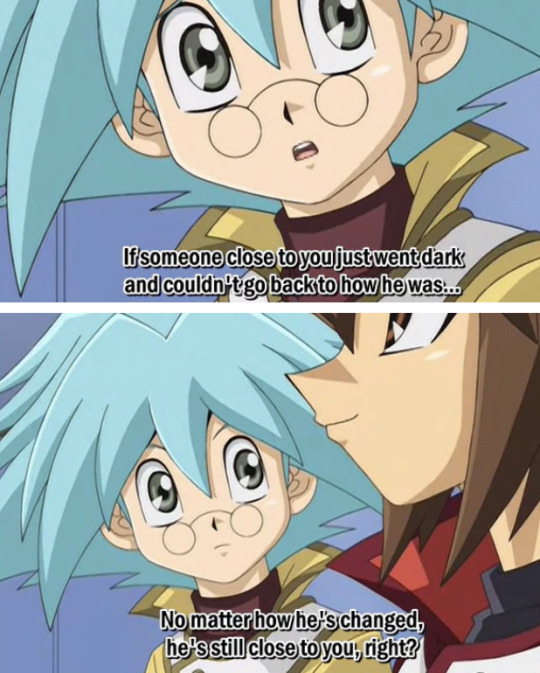
That's why if it were me. I'd probably just be looking after him until the very end, even if I didn't like him. I'd do it cause I think it'd prove that I care about him.
Judai doesn't even say that Sho is obligated to save his brother or morally redeem him, just that he has to keep looking at him instead of turning away or ignoring him.
Judai is being a bad friend, by his own definition. By choosing to deliberately look away from Yubel, Judai’s not living up to his advice for Sho for how you treat people you care about.
Which is why the resolution for Judai and Yubel’s arc is so important, because it’s done by Judai finally acknowledging Yubel’s pain, and promising to watch over them from now on, words that are followed by the action of physically fusing their souls together so they’ll never be alone again. Judai doesn’t just say pretty words about how they won’t ignore the crying child inside of Yubel, but instead he makes a sacrifice to save Yubel at risk to themselves to show their words are backed up by actions. Judai says Yubel will never be alone again, and then he commits.
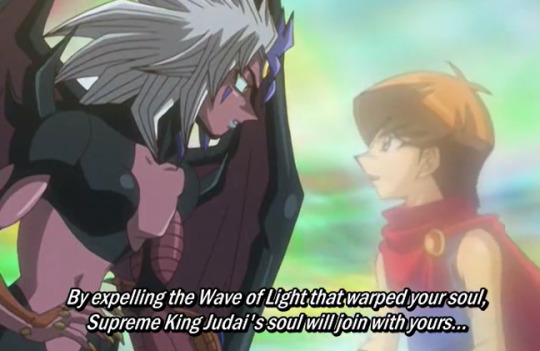
"And even if that means I won't exist anymore... I don't care."
Judai has resolved his character arc by this action, because Judai is finally taking on responsibility and that responsibility is watching over Yubel, so the two of them can atone together. Judai even says himself this isn’t an act of sacrifice on his part, but rather him finally accepting adult responsibilities.
Judai: I wouldn't sacrifice myself for you guys. I'm just going on a journey to grow from a kid into a man.
Judai needed to save Yubel to complete his character arc and grow as a person. If Judai hadn’t saved Yubel, he would have still remained an ignorant child. By learning not to turn a blind eye to Yubel’s pain, and also smacking sacrifices and physically doing something to atone for the way they ignored Yubel up until this point they’ve not only saved Yubel they’ve also done something to address their wrongs. This also continues into the fourth season where Judai’s personal growth results in him learning what kind of hero he wants to be as in Season 4 in order to atone for the spirits that Judai slaughtered, he decides to leave his friends behind and walk the earth with Yubel helping spirits and humans get along with each other. In fact Judai’s final speech as a character isn’t even about how strong he is as a hero, but how weak he is as a person.
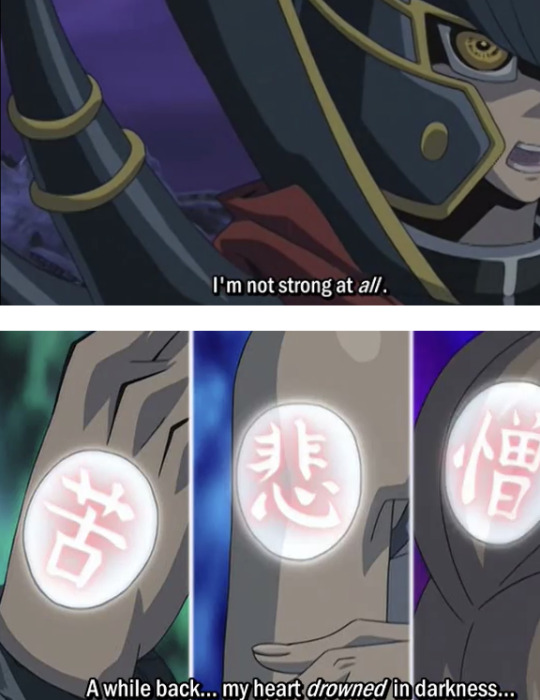
And I put my friends through some rough times. Form that, I figured a few things out... all I can do is believe in them.
The lesson Judai learned is because he’s weak, he needs to empathize and believe in other people the same way that his friends once believed in him when he was at his lowest point. Judai’s not the strongest hero, he’s the weakest one, but that gives him the ability to empathize with people who were lost just like he was, and guide them back from the darkness.
The story of how Deku became the worst hero.
I’m going to say this right now it might turn out next week that Shigaraki is just fine, and he’ll use the overhaul quirk to reconstruct his body. However, even if that happens Deku has completely failed at his goal of saving Shigaraki for the reasons I’ll illustrate below. In theory, Deku’s arc of saving Shigaraki, and therefore winning by saving should be much easier for the story to accomplish and also much less frustrating to watch. After all, Shigaraki has been around since the beginning of the manga, he’s literally the first villain that Deku faces. He’s also the first villain that Deku talks to, where he brings up the idea that there were some people All Might failed to save. There’s also many intentional parallels between the two characters, the entire manga is about their parallel journeys of becoming the next generation hero and the next generation villain. Shigaraki even directly quotes the line at one point that all he wanted was for someone in his house to tell him he could still be a hero, the same line Deku said in the first chapter was that he wanted his mom to tell him to be a hero instead of apoalogizing to him for being quirkless.
Not only is the setup for Shigaraki and Deku made obvious (Deku can redeem Shigaraki by telling him that he can still be a hero too), but Deku himself states out loud that he wants to save the crying child inside of Shigaraki.
Judai runs away from Yubel the whole time, whereas Deku is running towards Shigaraki and actively makes it his goal to understand Shigaraki and continue to see him as a human being rather than a villain. The story also makes it clear that saving Shigaraki is necessary to saving hero society as a whole. After all Yubel is just Judai’s victim. Whereas Shigaraki is the victim of all of society. He’s the crying child who was ignored. The cycle won’t be broken if heroes continue choosing to ignore people like Shigaraki, because more victims will grow up to replace him.
Shigaraki: Everything I've witnessed, this whole system you've built has always rejected me. Now I'm ready to reject it. That's why I destroy. That's why I took this power formyself? Simple enough, yeah? I don't care if you don't understand. That's what makes us heroes and villains.
Shigaraki rejects the world because the world continues to reject him. THe solution to this problem is not rejecting Shigaraki, because Shigaraki won’t go away, the system will just continue to reject people like Shigaraki. As long as heroes and villains don’t understand each other, they’ll keep being forced to fight and the conflict won’t end, because hero society is what engineers it’s own villains.
clear as day by the story itself. If the objective of saving Shigaraki is clear, then how exactly did the story fail in this objective? What went wrong? In this case it’s a failure of framing, and breaking the rules of “show don’t tell.” Stories are all about actions and consequences. When a character makes a certain action in a story, the way other characters around them, the world, and whatever consequences that action frames that action in a certain light. It provides context for how we are supposed to interpret that character in that moment.
For example, when a character does something wrong and another character directly confronts them over what they did wrong, that frames them as in the wrong. The story is criticizing the character for what they did wrong. Context is everything in a story. Stories are just ideas, so they require framing and context to communicate those ideas for the audience. Certain character attributes can be strengths or flaws depending on the context. My go to example is that if you put Othello in Hamlet, the conflict would be resolved in five seconds because Othello’s straightforward personality and determination would have him kill Hamlet’s uncle without questioning things. Whereas, Hamlet constantly questioning and second guessing himself would lead to the worst ending possible. However, if you put Hamlet in Othello, then Hamlet wouldn’t fall prey to Iago’s manipulations, because Othello doubts and questions everything so he wouldn’t believe Iago the way Othello did.
Hamlet’s contemplative and introverted nature can be a strength in one situation, and a flaw in another. Othello’s tendency to act without thinking things through can be a strength in one situation, and a flaw in another. Context matters, because context tells you how you’re supposed to interpret a certain characters actions, and therefore tells you more about that character. This is why people repeat “Show don’t tell” as the golden rule of storytelling, it’s one thing to say something about a character, it’s another to us the characters actions in the story itself to show them something about the character.
What’s even worse then breaking the rules of show don’t tell however, is telling the audience one thing, and then going onto show in the narrative something completely different. In that case the narrative becomes muddled and confusing to read. If I the narrator say “Hamlet is someone who overthinks everything” and then in the story Hamlet walks up to his uncle and kills him with no hesitation, then the narrator is straight up unreliable. It becomes impossible to tell as an author what message I’m trying to get across about these characters, because I’m telling you one thing and showing another.
This is why the writing fails in the second half of My Hero Academia because we are constantly told one thing, but then the story shows something entirely different and sometimes even contradictory to the thing we are being told.
Judai is a much worse hero than Deku, he always runs away from Yubel, and we’re never directly told that he’s supposed to save Yubel either. However, the narrative is incredibly consistent. Judai’s behavior of running away is consistent with his character. All the other character call Judai selfish for abandoning his friends (and they’re not even talking about Yubel). Judai is never painted in any positive light for his actions, therefore we as the audience understand Judai’s behavior is wrong and he needs to fix it. The narrative makes it clear that Judai needs to grow up, and Judai is never rewarded for his refusal to grow up, he’s ruthlessly chewed out, not by his enemies but also by his own friends. However, the narrative isn’t merciless on him either. Season 3 of GX is dark, but it’s not grimdark. Even when Judai loses his way, he’s still shown love and compassion by those same friends who go to great lengths for his sake. The narrative criticize Judai but it never insists that he’s beyond redemption and needs to be put down like a mad dog.
The message is very clear, that not only does Judai need to grow up, but he also deserves the chance to grow and change, which is why he should give Yubel a similar chance. In comparison the story sets out this clear narrative arc for Deku of understanding Shigaraki, but it never challenges him for failing to understand Shigaraki. If you listen to what the narrative says, how other characters describe Deku, and what Deku himself says and only read it on a surface level then yes, Deku’s goal is to save Shigaraki. If you analyze actions however, he is in effect just like Judai he never takes any meaningful action or steps towards Shigaraki, nor does he think of what saving Shigaraki might look like or entail.
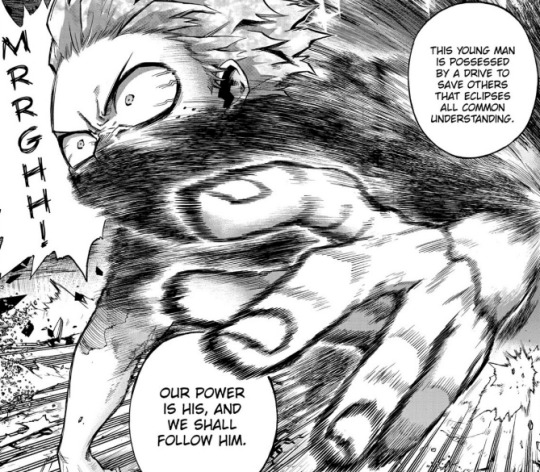
The story describes Deku as someone who is possessed by a drive to save others that eclipses all common understanding, but does the story give us any examples of that behavior?
Judai is characterized as a selfish, irresponsible child, and the story gives us countless examples of his immaturity and how it hurts others. Does the story of MHA do the same for Deku's purported virtues? Let’s run through Deku’s actions, step by step, the actions themselves and how they are framed in order to find any evidence that Deku possesses this drive to save others. Does Deku reflect at all on the question of:
Can Shigaraki be Saved?
Deku leaves on a journey to try to understand villains. When he makes a perfunctory attempt to understand and empathize with Muscle, and Muscle replies that some people are just evil does Deku keep trying to reach his heart? Nope, he just punches him.
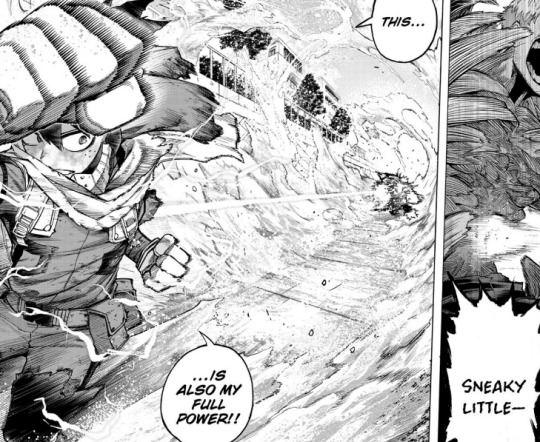
Well, if he’s failed in his goal of understanding a villain then does the story call him out on his failure? Does Deku face any sort of narrative consequence for that failure? Is he framed negatively for failing to understand Muscle, the same way that Judai is framed for abandoning Yubel? Nope. Deku doesn’t express any frustration at all over is inability to reason with Muscle. There’s also no negative consequence for Deku just choosing to punch muscle, it turns out that there was no reasoning with Muscle and some people are just bad eggs so Deku was right. It’s okay for characters to fail, but if a character fails and it’s not framed by the story as a failure then the writing itself as failed. Why even bother to include this scene in the first place if it doesn’t advance Deku’s character in any way? This scene in spite of showing Deku failing to understand someone actively paints Deku in a positive light, because of how much stronger he is ow that he can OHKO a guy that gave him trouble all the way back in the camp arc.
This scene doesn’t tell anything about Deku as a character, it just makes him look cool. In fact that’s precisely the problem, Deku isn’t adequately challenged as a character, because he’s never allowed to fail. Even when he does obviously fail at the things the narrative set out for him to do, he’s never challenged on those failures, because the priority isn’t to make Deku grow, it’s to make Deku look good. As I said before, Judai is the hero because he’s the weakest. Deku is the hero because he’s the strongest. Well, next a big flaw on Deku’s part is that he worshippd the same heroes that were making the world corrupt. Heroes like Endeavor who created people like Dabi. So, does Deku take action to either criticize the older generation of heroes, or separate himself from them in order to try to be better than them? Nope, he teams up with them. Not only that, Deku can’t do something as simple as tell Gran Torino out loud about his plans to save Shigaraki. If Deku feels that Shigaraki is worthy of salvation then he should at least try to make an argument here about his ideal of saving others.
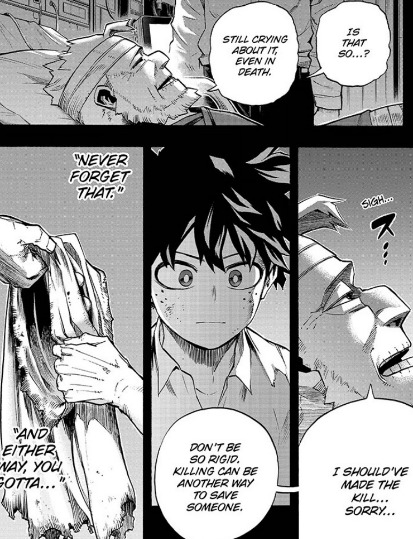
Now here’s the thing, if Deku hadn’t directly looked at the camera and told us he wanted to save Shgiaraki, would we be able to deduce his intentions from his actions? If you took away all of Deku’s internal monologue, and just showed him punching Muscular and saying nothing when Gran Torino says he may have no choice but to kill Shigaraki would anything about Deku’s actions indicate that he wants to save Shigaraki? Let me use avatar the last airbender as a positive example for a moment. People say that Aang’s desire to spare Ozai’s life comes out of left field, but like if you analyze Aang as a character down to their bending, and the way they react in situations they always prefer de-escalation, or taking a third option as opposed to confronting things head on. It’s literally why Toph says Aang has trouble learning earth bending, because as an airbender, he always tries to look for some other way to solve the problem, instead of a direct confrontation with force. As early as season one, Aang tells Zuko someone who has tried to kill him several times that he was friends with someone from the fire nation one hundred years ago and in a different situation they could be friends. Aang’s desire to save the Firelord may not have been told to us until the last possible minute, but Aang’s aversion to violence has always been a part of his character from the beginning. However, Deku never shows any similar aversion to violence. There’s basically no example where he ever tries to de-escalate a situation, or he avoids a conflict by seeking a third option.
Anyway, let’s move onto the next example. In the confrontation where Lady Nagant fights Deku, when Deku learns the fact that the heroes were employing government hitmen to attack people for uhh… exercising free speech does Deku give any reaction to this information? When Lady Nagant says that Deku is only going to bring back the status quo, does he show her any meaningful evidence that he won’t do that.
Deku’s response is because the world is so grey, he needs to extend a helping hand to others. Which you know what thay could be a response. Deku saying that his response to the corruption of the hero world is that he now understands that society led some people down the wrong path, so his way of addressing the wrongs of that society is lending a helping hand to as many people as possible even people he used to think was irredeemable.
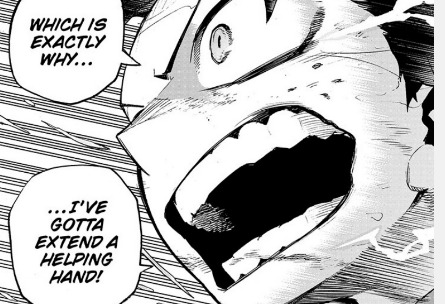
I will give Deku the benefit of the doubt, I think this is an acceptable answer. I can’t save everyone, but that’s not going to stop me from trying to save as many people as possible and maybe I can save people who were this society’s victims on the way too. However, does Deku demonstrate his resolve to extend a helping hand in any meaningful way.
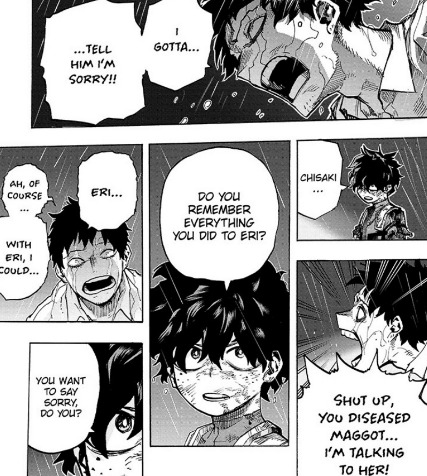
Deku is met with an armless, insane Overhaul who’s begging for someone to help heal his father figure in the Yakuza from his coma. This isn’t like Muscular who insists that there’s no helping him, Deku is met face by face with someone asking him for help. Deku’s gotta extend a helping arm whenever he can, because he knows some people were abandoned and led astray by this society… Unless that person is someone he doesn’t like personally. At which point he only helps them on a conditional basis. We are told Deku will save anyone and everyone, but Deku is met face to face with an armless man who is begging for help and Deku’s does nothing to help him. Deku’s not criticized for refusing to help overhaul either, it’s never brought up again. When Deku begins to experience a mental breakdown because of all the people he’s trying to help in the Dark Deku arc, we are told this is the result of Deku trying to save everyone, but we do not see Deku attempting to save a single villain after Muscular and Nagant.
He exhausts himself beating up villains that AFO sends after him, and only helping innocent civilians. Which would be fine if this arc were about how Deku is running away from his real responsibilities the same way that Judai was running, but that’s not what we’re being told. We are told that this is all part of an arc of Deku learning to understand villains and be a hero.
Deku is asked “Can you save Shigaraki?” by the story, but Deku never at any point has to deliberate on that question. Judai doesn’t deliberate on that question either, but him choosing not to think about things and stay ignorant is the point.
It’s actually fine to make Deku stagnate as a character. It’s fine to have him take the easy way out by just punching villains and giving up on them after one conversation. It’s fine for him to be empathetic to other people’s suffering, or even self-righteous. It’s fine for him to be ignorant.
He could be all of those things if it was a part of a narrative teaching him to unlearn his behavior. In fact the narrative might have been better if Deku started out by saying he didn’t want to save Shigaraki, that there was no choice but to kill him, because then at least his actions would be consistent with his words. Then his lack of empathy and his tendency to resort to violently beating up villains instead of avoiding violence would be character flaws he could work on. Deku however, is presented to us as this empathic hero who is always willing to give others a second chance though he never actually sticks his neck out in order to do so. Continuing on with our slow crawl through MHA, one of Deku’s friends is revealed as the traitor. Deku has a heartwarming scene fo saying that Aoyama can still be a hero, but look at his actions. He lets the adults in the room physically tie Aoyama in a straightjacket and imprison him, for the crime of… doing bad things while he was in a hostage situation. Apparently, if a bank teller helps the bank robber by giving them money when the robber has a gun to his head, the swat team should just snipe the bank teller. Not only does he not defend Aoyama against the adults, or stand up for him, or tell the adults they’re wrong to treat Aoyama a clear cut victim who had a gun to his head and was bing held hostage like he’s a villain - he also lets the adults use Aoyama an innocent victim as bait in order to lure out AFO. Deku tells Aoyama he can still be a hero, but he doesn’t defend Aoyama as a victim of being taken hostage, nor does he stop the adults from further taking advantage of him and throwing him right into danger. Some people are just led the wrong way that’s why they need to be extended a helping hand, but fuck Aoyama I guess. He needs to earn the right to be sympathized with by physically putting his life in danger.
Deku can’t even go out of his way to save a friend who he’s known for the better part of a year, when that friend is a complex victim forced to do bad things.
Then Deku and Uraraka have a conversation where they both, kind of ruminate on the idea that maybe the villains are human beings who are worthy of sympathy.
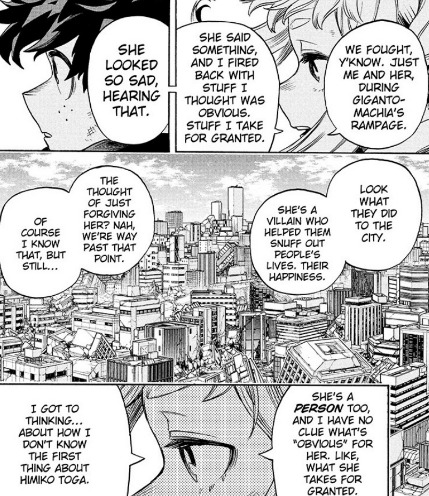
In fact Uraraka is actively trying to dehumanize Toga by looking at the destroyed city, so she won't have to think of Togaas a person.
The language here is also a major fault of this arc. It focuses far too hard on “forgiveness” over and over again. As I said before, saving Shigaraki isn’t about Shigaraki at all, it’s about Deku, and how he wants to use his power as a hero. Deku has even stated himself that he doesn’t believe that OFA is a power that should be used for killing people. So why does whether Toga or Shigaraki are forgivable or not even matter? It’s the same with Deku refusing Overhaul any sympathy. If he’s so morally opposed to abusers, then why does he work with Endeavor and defend him at every visible opportunity, even in front of his victims? Whether or not Deku can forgive Shigaraki doesn’t matter, because Deku is not the moral arbitrator or right and wrong. In fact Deku doesn’t even have any morals, so how is this a moral debate? Is there any point where Deku gives a clear definition of what he thinks right and wrong is? Does he quot Immanuel Kant to the audience?
Batman doesn’t kill people, not because he thinks that every last person on earth can be saved, but because Bruce Wayne an incredibly rich white man thinks that maybe he shouldn’t have the authority to decide who lives and who dies. When Bruce doesn’t kill the joker, it doesn’t mean he thinks the Jokers actions are forgivable, it’s because Bruce thinks it’s not his place to determine whether someone has the right to live.
The whole conflict that MHA presents us is that heroes pick and choose who to save, and only save the ones they deem as innocent. So, how does Deku saying repeatedly they can’t forgive Shigaraki contribute to that theme in any way? In fact by focusing on forgiveness, rather than whether or not he personally has the right to pick and choose who lives and who dies Deku is ignoring the elephant in the room. The question isn’t about whether Shigaraki’s redeemable or if his deeds should ever be forgiven. The question is whether Deku has the right to decide who gets saved and who doesn’t.
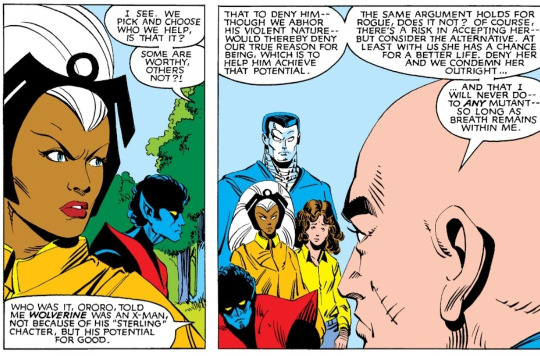
We are told that Deku as a character is someone who wants to save everyone no matter what, so Deku shouldn’t be focusing on whether or not Shigaraki is worthy of forgiveness, he should be making an idealistic argument like Xavier does in this panel. Why doesn’t Deku talk out loud with Uraraka on how he believes his power is for saving others, and not killing? If he’s meant to represent some idealistic hero, then why doesn’t he even talk about his ideals? Why don’t I as the reader know what those ideals are?
I think Xavier’s ideals of forcing the X-men to provide a good example to the mutant community, in order to try to earn the respect of other human beings is wrong, but at least he has ideals. He tries to inspire the other people around him to live up to those ideals. The story can criticize him for his ideals and point out how they’re wrong, while it can also uplift parts of his idelogy like where he believes there are no evil mutants. Deku has a chance to do the same to Uraraka, to tell her clearly, “I don’t think we as heroes have the right to pick and choose who we help…?” but he waffles. Not only does he waffle, but this moment is meant to be read as an indication that both Deku and Uraraka are sympathetic individuals who want to save their villains. They are supposed to look good and idealistic here and they don’t. For Deku it just seems like a repeat of his behavior with Overhaul. The only villains that are worthy of sympathy, are the ones that he personally decides are forgivable.
The story isn’t about whether or not it’s moral to save someone who’s killed as many as Shigaraki has. The story never seriously discusses any sort of complex morality or moral philosophy. Once again to bring up avatar, yes you can argue Aang sparing the life of a war crimminal is bad, but Aang mentions on multiple occasions that he wants to retain the cultural values of the airbending people. Aang has a morality, a consistent morality, it might not be a morality you personally agree with but at least he has one. Deku hates abusers, unless he’s next to Endeavor then he thinks abusers should be given the chance to atone. Deku doesn’t believe that One for All is a power for killing, but he never stands up to any of the adults who are blatantly trying to kill Shigaraki, he doesn’t even express out loud to Uraraka that he doesn’t think heroes have the right to decide who lives and who dies. In fact he’s given the perfect opportunity to, when Hawks kills a villain and it’s broadcast live on the news in font of everyone, but Deku never has anything to say about that. The reason Deku and Uraraka both put such an emphasis on “forgiving” their villains has nothing to do with the story itself. It’s because the author Horikoshi, is afraid that some people will misinterpret his story as saying that he actually thinks that saving a villain like Shigaraki means that he condones mass murder, so he has to have the characters talk about not forgiving Shigaraki.
Judai doesn’t have any consistent morals either, but once again that’s the point and something the story relentlessly calls him out on.
Cobra: Fortune would never smile on a fool like you who fights while prattling on about enjoying duels. Cobra: You are certainly a talented duelist. But you have one fatal flaw. Judai: A fatal flaw? Cobra: Yes, your duels are superficial. Someone who fights with nothing on his shoulders, cannot recover once he loses his enjoyment. What a duelist carries on his shoulders will become the power that supports him when he's up against the wall! Cobra: But you have nothing like that! Those who go through life without anything like that cannot possibly seize victory. Cobra: But I know that nothing I say will resonate with you... because you have nothing to lose but the match. Judai: I... Cobra: Afraid aren't you? Right now, you have nothing to support you.
Judai’s regularly called out for his superficiality. Judai is only a hero because he’s strong and wins fight, he doesn’t feel any responsibility towards other people, and in fact he loathes having to feel responsible for others. Judai isn’t just naive, he deliberately chooses to remain ignorant. Since he’s ignorant of his own faults, he makes awful decisions when it comes time for him to lead, and his friends die because of choices he made. We are told that Deku doesn’t want to remain ignorant, that he wants to understand villains, but Deku’s actual actions are him continuing to ignore society’s ills and the suffering of victims. In fact if you take away Deku’s internal monologue and the narration, Deku’s actions almost exactly mirror Judai’s.
Deku is just as superficial as Judai, and he also doesn't want to spend any time thinking about what kind of hero he wants to be, but the narrative never punishes him for it.
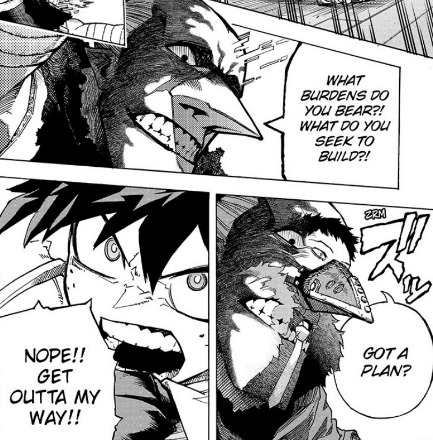
Judai is asked what burdens he has to bear and he has to meaningfull answer that question, Deku is allowed to get away with not having to think about anything. Deku remains superficial. Both Judai and Deku spend the entire arc running away from their villain rather than confronting them in any meaningful way. They both never express out loud any sympathy for their villain, or try to empathize. THey both never step down from the role of hero, and only confront their villain as a hero, because they don’t want to think about themselves as complicit or in the wrong. Shigaraki and Deku’s final confrontation mirrors Judai and Yubel’s but without the same clear framing. THe entire time Yubel is trying to get Judai to empathize with them, and Judai only responds with physical violence, because they don’t want to stop being the hero and because they can’t see Yubel as anything other than the villain. As soon as Deku arrives on the battlefield (by the way everyone else and their mom pointed this out, but Deku who doesn’t think OFA is a power for killing, is completely okay with a plan called the “Sky coffin plan” where every other hero was clearly trying to murder Shigaraki).
When Deku arrives he asks if Shigaraki is still in there, but he doesn’t do anything to try to reach Shigaraki, he jumps right to punching him. In fact he never tries anything besides punching him as hard as possible. How is punching Shigaraki with the force of a thousand suns saving him exactly? How is that different from how he tried to defeat Shigaraki the last war arc, before he saw the image of the crying child that made him want to try a different approach in saving Shigaraki? In Judai’s final fight with Yubel, it’s made explicitly clear that Judai is not trying to save Yubel, and that’s a fault on his part. In fact Judai gives the traditional “I have friends, and you don’t” speech to Yubel but it’s a subversion of how that speech is usually used. Usually that speech is used to show that the protagonist won because of they valued friendship,while the villain treated their friends poorly and only cared about power. However, it’s ironic in this case because Judai got all of his friends killed. Judai treats his friends like garbage. This speech isn’t used to show that Judai is winning because he values his friends more than Yubel does, it shows that Judai is a hypocrite, playing the hero in this situation where they are just as bad as Yubel. Judai’s not morally superior, he’s just lucky that he has good friends. Friends that were willing to save him. The only connection Yubel has to anyone else, Yubel’s only friend is Judai and Judai is a shit friend.
In fact, Mirio tries to give a version of the “You don’t have any friends” speech to Shigarkai, only for Shigaraki to get mad and tell Mirio that he does have friends and people he wants to protect.
This fact is also something that is blatantly ignored by Deku, even though Mirio tells him about it… even though we are told that Deku is trying his best to see the humanity in Shigaraki.
Judai blatantly admits they’re trying to kill Yubel. Which makes them a worse person, but a better character than Deku, because their actions are clearly framed by the narrative and consistent.
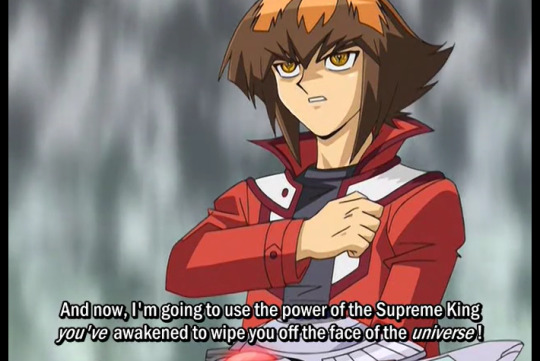
On the other hand we are told that Deku doesn’t want to kill Shigaraki, and yet everything Deku does makes it look like he’s just trying to kill Shigaraki and put him out of its misery. If we didn’t have Deku stating out loud that he wants to save Shigaraki and wants to see him as a human, there’d be nothing in his actions to indicate that he’s trying to avoid killing Shigaraki. Deku says he can’t pretend he didn’t see Shigaraki crying, but like, does he ever hesitate to punch Shigaraki, does he ever think that causing Shigaraki more harm is wrong when he’s already suffered so much? Deku says that Shigaraki is a person but does he treat him like a person? Does he try to talk to him like a person? To use avatar again, Aang does talk to Zuko pretty early on. Deku doesn’t even give the classic “We could have been friends under different circumstances” speech. When Shigaraki resists Deku’s attempts to see him as a person or emapthize with him, Deku’s response is to just resort to punching harder.
Which is in effect the same thing Judai does to Yubel, just kill them as a villain so they don’t hurt anybody else, but framed in an entirely different light. Judai is shown to be ruthless, and cold in his attempt to only settle the conflict with Yubel by violently putting them down. On the other hand we’re being told that Deku is compassionate and empathic while he punches Shigaraki with the force of a thousand suns.
There’s another eerie similarity between both of these final confrontations. At the climax of the confrontation, both Judai and Deku have a psychic vision where they see events from Yubel and Shigaraki’s childhood. This vision is supposed to help both characters understand the good in the villain they’re facing.
Let’s see the contents of this vision and how the visions change each character. Judai is shown a vision of his past life where Yubel sacrifices their entire body, and even their humanity to go through painful surgery to turn into an ugly dragon, all for the sake of protecting Judai in a previous life.
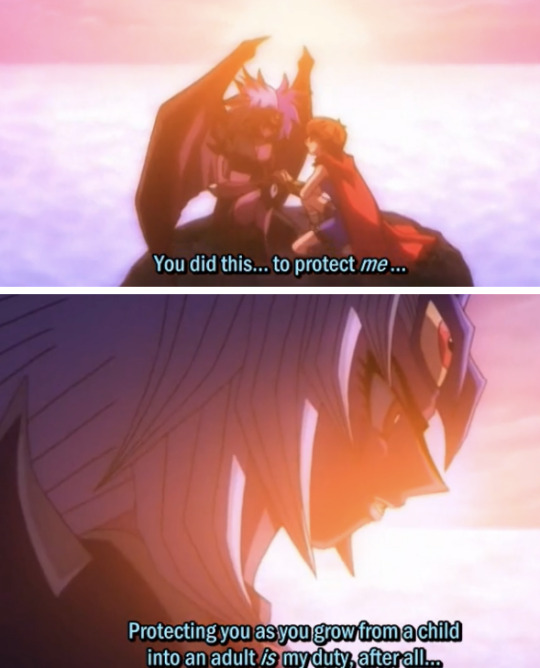
Judai is then forced to witness the good side of Yubel they’ve been ignoring all along to paint them as a villain. Yubel is simultaneously extremely selfish and willing to hurt people Judai cares about, but they’re also extremely selfless and will do anything to protect Judai and have made great sacrifices in the past for Judai’s sake. Deku gives lip service to not ignoring the humanity in Shigaraki, but Judai is literally forced to acknowledge the humanity in Yubel. Not only that, but Judai changes his behavior immediately after learning this new information. After seing the sacrifice that Yubel made for him in the past, Judai responds with a sacrifice of his own. A sacrifice that perfectly mirrors the sacrifice that Yubel once made for him. Yubel gave up their humanity for Judai, so Judai fuses his spirit to Yubel’s, becoming a human / spirit hybrid so Yubel no longer has to be alone.
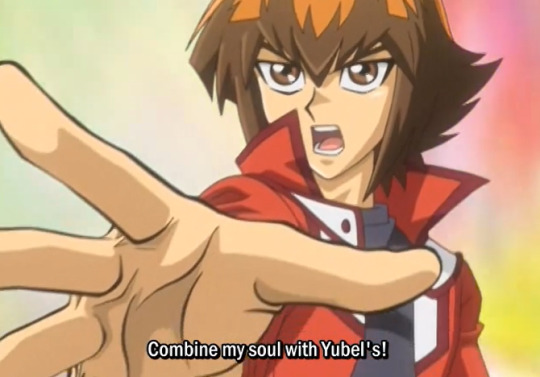
Judai also doesn’t just fuse their soul with Yubel’s in order to stop Yubel from destroying everything, it’s because both of them at this point need to atone together, and Judai is fulfilling his responsibility of watching over his friend until the end to prove that you care about them - as he said to Sho. Judai’s also fulfilling Johan’s dream of helping repair the bonds between spirits and humans, by reconciling with Yubel and repairing their bond. It’s also Judai atoning for his previous behavior of abandoning Yubel, by choosing to stay alongside them as they both atone together. Deku does sacrifice OFA during the fight against Shigaraki, but their sacrifice isn’t to help Shigaraki, but rather doing psychic damage to Shigaraki by using OFA is the only way to defeat them. He transfers OFA in order to break Shigaraki’s brain so he’ll stop reissting and Deku can beat him down. Judai fuses their soul together with Yubel out of empathy and a responsibility they feel to help their friend fater abandoning them, Deku transfers One for All to Shigaraki in order to hurt him and make him easier to punch. It's funny that Deku doesn't travel to Shigaraki's mind to learn more about him, but instead with the specific intent of harming him.
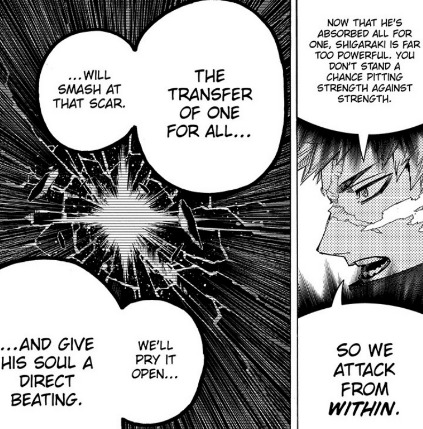
Once he's inside Shigaraki's mind, he doesn't take time to reflect on how Shigaraki used to stand up for bullied kids, or how he wants to be a hero to villains because no one else will stick up for the outcasts in society. No, he only care about Shigaraki when he takes the form of a child crying for help.
In the aftermath of the psychic vision Deku’s behavior doesn’t change towards Shigaraki in any way either. You could say he sacrificed his own arms in order to try to comfort Shigaraki within the depths of his own mind - but that’s not a real sacrifice either because his arms immediately come back. When Judai learns about the sacrifice that Yubel made in a previous life towards him, he stops seeing Yubel as an enemy and finds a way to resolve things peacefully between them. When Deku lanterns that Shigaraki’s a victim of All for One, and that his entire life was a lie, when he sees Shigaraki’s suffering first hand does his beavior twoards Shigaraki change in any way?
When he sees Afo has taken over Shigaraki’s body again, does he try to shout for Shigaraki, to tell Shigaraki to fight from the inside, to reassure Shigaraki that he’s still in there that there’s still good in him? Nope. He just punches Shigaraki some more.
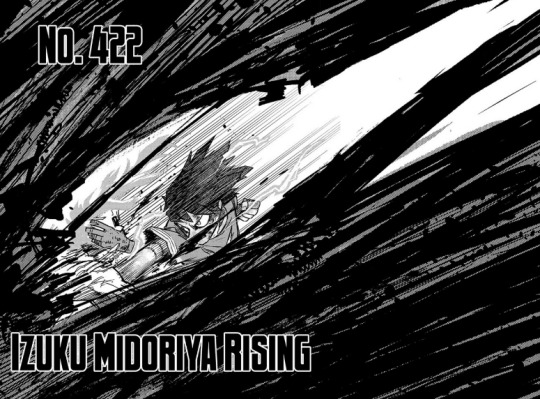
What Deku needed to tell Shigaraki is so obviously set up by the narrative too. Shigaraki wanted just one person in that house to tell him he could be a hero. Deku wanted his mother to tell him he could be a hero if he was quirkless. Deku sees that Shigaraki started out as a boy who wanted to be a hero, and who was manipulated into being a villain but does he try to appeal to the boy inside of Shigaraki by telling him he can still be a hero? Does he now see the good in Shigaraki? Nope, he just tries to kill him by punching him really hard.
I purposefully chose the images for the banner of this post, because it shows how differently MHA and GX treated its villains in the end. Yubel is embraced by Judai in the end, Shigaraki evaporates into dust.
"Judai, now that our souls have become one we will never be separated again. I have now been filled with your love and power. Let us fight together, against the wave of light leading this universe to destruction!"
Shigaraki could so easily have been given the love and empathy that Yubel was shown, but instead their life ends with no show of empathy from Deku, and with them dying believing that their long life of tragedy meant nothing in the end. Shigaraki realizes he's a crying kid, but he's never comforted.
Shigaraki: I only stole my body back from Master, and I didn't destroy anything. "In the end, I was just as you said... A crying kid, huh?"
Yubel is embraced and comforted, Shigaraki disintegrates into nothing.
One of these stories is apparently an optimistic story about heroes saving people, but it ends with the lifelong victim being killed in the most nihilistic manner possible, never receiving comfort, and never achieving anything with his long life.
The other story is a silly anime about card games, shows that when people are alone and suffering they can lash out and do terrible things. That all people are weak especially when they're alone, but the solution isn't to abandon them, or condemn them for their faults, but to believe in them and help uplift them the same way that Judai decides to uplift Yubel so they can atone together.
Which is why Deku gets an F in being a hero. Go directly to summer school. Do not pass Go. Do not collect $100.
#mha meta#ygo meta#mha 423#bnha 423#mha 423 spoilers#bnha 423 spoilers#izuku midoriya#deku#shigaraki tomura#tenko shimura#judai yuki#yubel#soulshipping#yu gi oh gx#yu gi oh
769 notes
·
View notes
Text
coincidence! (2)
series summary. the holy grail of the seven men who ruled the country's entertainment used to be your friends at school. now, ten years later and between successes and failures, what reason would they have to want to come back into your life? pairing. eventually ot7 x f!reader. content. first of all, english is not my first language so sorry for any mistakes! curse words, we're still on the safe zone, angst if you squint, just silly writing! a/n. hi guys! finally second chapter is out! im blown away with your response!! thank u so much from the bottom of my heart! i loooooved reading your comments <33 pls remember updates are weekly or biweekly! and if you want to be tagged pls say so in the comments! see you next week ;)
series masterlist | bts masterlist | previous | next
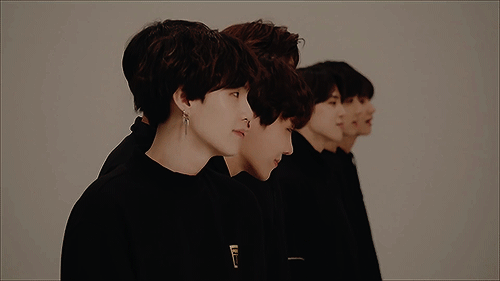
“This is unbelievable! We're going to be rich!!!”
“What makes you think my sister is going to give you any of that money?”
“I created that Instagram account that was tagged in Kim Taehyung's damn story, I deserve a raise!”
“What makes you drones think my daughter is going to give you any of that money?”
“None of you are going to get anything out of that act of feigned innocence. Honey, are you all right?”
It seemed like a light had gone on in the room, four pairs of eyes landing on your still pale, surprised face. The night had been heavy after Yuna's call and you'd had so little sleep that you didn't know how you were functioning at the moment. Maybe that was the thing: you weren't functioning at all.
When you woke up, you thought it had all been a bad dream and that definitely the first exposure you'd had to the guys in years hadn't been because Taehyung came across your books at a convention you decided not to go to and uploaded them to his Instagram account with over eighty million followers. It was impossible, wasn't it? Too crazy.
Maybe not as crazy as waking up to your parents banging on your bedroom door saying that over a hundred thousand orders had been placed overnight and they didn't have enough book production for that much demand.
Be that as it may, Yuna and your mother took care of the communications on the account. You went from having twenty followers (including your family and friends —your father had created an account exclusively for that and only followed you—), to almost sixty thousand in at least twelve hours. The posts you had worked so hard to create and put together were finally getting the attention they deserved, but it had all happened so fast and suddenly that it was too strong to process calmly.
Weighing which was stronger, whether Taehyung's acknowledgment of your existence after so many years of zero contact or that your book sales shot up so immeasurably that they couldn't even keep up with demand, even if a month went by, didn't make things any easier.
“She's obviously still in shock,” Yuna replied to your mother at your lack of response from the living room, right across the dining room where you had been sitting since you had come down from your room. Your breakfast was still untouched on the table, but that seemed to be the least important thing in the room with all the more important news.
“Have the printers answered yet?” your brother's voice through the speaker of your father's phone rang as you blinked, reality settling too slowly on your shoulders. You didn't even want to think about what it meant that Taehyung had done that. Maybe it was simply an altruistic act, wasn't it? Maybe he felt guilt and wanted to ameliorate it somehow. What better way than to do an act of charity?
“I'm on it,” your father was sitting across from you in the dining room, his laptop on the glass of the table as he moved his hands over the keyboard and stared through his glasses at the full tip of his nose. From the way his eyes narrowed, your mother snorted.
“Why don't you get those glasses adjusted if you know you don't see well up close, let alone on electronic devices?” the woman reached over, dragging your father's glasses until they were almost glued to his eyebrows. Your father barely gave her a goofy grin as your mother started shaking her hands. “You better move. I'll do it. You write too slow; you're getting on our son's nerves.”
“Nah, I'm fine. I don't know if y/n is tho.”
Silence returned and you growled internally. Well, that was enough conjecture and assumptions without any information to substantiate them, it was time to get down to business.
“Do you think we should take over this business now?” Yuna completely ignored your stretch and you sent her a confused look.
Your brother exclaimed from the phone in agreement. “I call dibs on the treasury!”
“There's no way you can keep the accounts right! You're studying law.”
“Seojun is good at numbers, Yuna.”
“Ha, with all due respect Mrs. I/n, he must only be good at counting sheep.”
“Hey,” you tried to get attention, getting up from the chair.
“y/n, don't talk, you're still in shock. Can you believe he once called me from the supermarket to ask if he got his change right? He didn't even move from the checkout counter. There were people booing him.”
“Ow, my poor baby.”
“I told you not to say that to anyone!”
“I can't keep quiet if they're speaking lies about you!”
“This wasn't lies! This is about my pride!”
“Nonsense. I'll handle the treasury. I double majored in finance and international relations for a reason.”
“You can't run anything without starting bossing everyone around!”
“It's not my fault you're a good-for-nothing!”
God. It was going to be a long day.
-
Sorting out the whole printing issue and the number of orders was difficult, but with a couple of stories, interactions with new followers and express delivery of the few copies you'd already had at home for months, the waters calmed down a bit. Now, in the stifling silence of your room, you wanted to run.
“Are you going to stare at the ceiling all night?”
“Maybe.”
Yuna watched you from the bed while all you could do was stare as notifications continued to pop up on your Instagram account and your mail because the requests simply wouldn't stop, even though you had made a thousand clarifications to all the new followers. You were trying to focus on the bright side of things, regardless of whatever reasons there may have been for everything to have happened that way, but with your friend's incessant gaze lying on your bed it made it a little difficult. You knew she wanted to pierce your skull from curiosity, but you wouldn't know how you would answer her questions.
“Is there anything you'd like to share with the class?”
The tension had become a little more latent during the last few minutes, when Yuna saw a specific notification on the account. Kim Taehyung and Park Jimin had followed you. To describe your look of shock might be an understatement, and all you did for the next half hour was run across the room and throughout the house vociferating that you were living a nightmare.
Yuna has known all along that you had never been a fan of the siamese or their clan of friends, but she never knew why exactly. You had to tell her that you weren't interested in fashion, that you didn't like the kind of music Jungkook made, that hip-hop was never your thing, that you weren't interested in dilfs and you weren't interested in dance either. You had to tell her that all the things you once did with them didn't matter to you because it was painful, even if it was hard to accept.
You couldn't remember the times you would go shopping at the small mall in town to buy the trending clothes to put together different outfits with Taehyung and Jimin, then go try them all on at your house and invite the others and even your parents to do an impromptu runway show. You couldn't remember how the genre of music that Jungkook and you listened to all the time on his iPod and your MP3 player was the same one that his entire music career focuses on. You couldn't remember the nights when Yoongi would share his writings with you and you would help him compose a song or two on the piano when he felt brave enough. Or the times when you would accompany Hoseok to his workouts and then watch him create dance routines to his favorite songs while Jungkook sang in the background. You also didn't want to remember the times when Namjoon and Seokjin would sponsor their trips and give everyone gifts without expecting anything in return.
You couldn't remember those things. It was too much to bear for such a weak heart.
“What do you want to know?” you sighed, your body sliding on the chair as the notifications grew.
“How did all this happen?”
“Why do you think I have an answer for that?”
Yuna clicked her tongue, sitting on the bed with the cell phone still in her hands, still staring at the notification that snapped her out of her sanity.
“It's just… this is all unbelievable, magnificent and unreal. But how come you're not so excited about what happened?” Yuna slid across the sheets, to be right in front of you, but you refused to look away from the computer. Every time you thought you had overcome and grown around everything that happened so many years ago, something would pop up to remind you that you still had a long way to go. Maybe the nostalgia was strong, but so was the anger. “Regardless of how things turned out, because I know you're not as big a fan as me, this opens a million doors for you and I don't know why you're not celebrating it like we are.”
“It's…complicated.”
“I don't think so. Tell me.”
Yuna was unstoppable when she wanted to get answers out, but besides the obvious, of course there was something else that bothered you and kept you from enjoying this boom so much.
“It's just that all of this doesn't feel like it was a product of my effort,” you began, letting your gaze wander over the desk. The copies of your books you kept for yourself, the first ones you'd ever printed several years ago, lay there, as tattered as your failed accomplishment. “It doesn't feel like an achievement that my work had exploded thanks to a celebrity whose fans would buy even the toilet paper he uses. A lot of those people won't even read the book. They will just buy it and take a picture of it to say that they have the same book that the great Kim Taehyung read. Many of those books will never have a life, they will just be dust collectors and be reminders that all this did not happen because of my effort.”
“What the fuck are you blabbering about? Of course it's the fruit of your effort! Of course you deserve it!” Yuna got up from the bed and moved the chair around the back to leave you in front of her disgruntled and almost offended face. You could see the words drawn in her face. “You worked so many years to pull this off and after so many bumps you finally can! You deserve to have what you wanted so badly. This recognition will last just the same because many other people will read them and love them and they may not be many, but you will form a solid foundation as time goes on with people who will be truly unconditional and supportive and that will grow over time. Don't look at this so negatively, maybe you skipped a couple of steps, but you had every right to. It was what you deserved after all the effort and dedication you put into this project for so many years.”
Yuna didn't hesitate for a second. Her very serious expression sent a shiver down your spine and you could tell from her furrowed brow that she really was angry at your perception. Perhaps she was right, but without knowing the full background of this specific situation, you were only left to shake your head in assent and send her a grateful smile.
“I guess you're right,” you lifted a shoulder, turning your gaze back to your mail notifications.
“Of course I am!” the smile returned to her face and it didn't take long for her to look back down at her phone with sparkling eyes. “Now that we got the emotional charge out of the way, would you mind telling me how you know Taehyung?”
Your breathing stopped for a second and you cursed yourself because it sounded too loud as you almost choked on your own saliva.
“Oh?”
Play fucking dumb.
“What, did you think I wasn't going to notice? He wrote it crystal clear.”
Yuna wasn't even looking at you, too focused on running her finger over the row of notifications. Her nonchalant demeanor only caused you to panic more. It was as if she had caught you red-handed.
One of the best writers I've ever met in my life, damn you Kim Taehyung.
“Ah… I didn't… I didn't really know him so let's just say…”
“He couldn't have said that for nothing, don't you think? No celebrity would do that unless it was a person they hold in deep regard.”
Yuna had just caught you totally off guard. Maybe you should've focused a lot more on what Taehyung had written before you blocked his user from your personal account and threw the phone in the bottom of your drawer the night before and tried hard not to think about the rest for the rest of the night and all that day.
“It's just that… uhm… we studied at the same school. But for a short time actually. I don't even remember it well actually, ha, ha.”
Your laugh came out too constrained under your friend's narrow-eyed stare. You knew you'd have a hard time convincing her because you were a lousy liar.
“You know, it always struck me as odd that you weren't a fan. Taehyung and Jimin are like the two extremes of your ideal type.”
“Whaaaat?”
“And Jungkook's music is literally the kind of music you listen to, you just don't listen to his. All the other artists in the same genre you do listen to.”
“That has nothing to do with…”
“And even your parents don't claim to know Kim Seokjin when your mother was literally a nurse. She probably worked with him.”
“What does that have to do…?”
“And your brother is a hip-hop fan. How come he doesn't listen to Agust D? He's the best rapper of the last few decades and he's been trending for a long time.”
“…”
At what fucking moment?
“And all of them, plus Hobi and Namjoon, they all went to the same school. They're all friends. And you say you went to school with Taehyung?”
“Ahm… well, yes, but it's not like I would have met the others.”
Yuna looked at you, really looked you straight in the eyes as if that way she could tell what it was you were hiding or as if that solved all her guesses. It was impossible for her not to figure it out if she had already tied up all the damn loose ends.
Since the boys had left one by one, clearly your family was the first to realize how much their departures had affected you. In the beginning there was communication and all, but when Jungkook was the last to leave you lost any kind of link with them completely. You never knew exactly what happened because no matter how hard you tried to contact them you couldn't, not even your parents could talk to the boys' parents. Perhaps they had simply grown up, matured, completely forgetting about their ordinary life in that town.
They seemed to have disappeared from the planet.
Until your family moved to the capital. Jungkook was just starting out as an idol, but he had an amazing debut. He had captivated the entire audience and was too successful almost from the second one. It was a torment to watch them grow professionally little by little because, although you were happy for their achievements and all, you couldn't forget that they had basically abandoned you. And your parents and Seojun had noticed. They had noticed how much seeing them all over the place was bumming you out, so unreachable when at one point they were all in your living room eating your mother's delicious kimchi and listening to your father's anecdotes. Everyone was affected by their departures, but clearly no one as much as you.
That's why, of course, your parents and brother had made a silent vow to keep all media about the boys away from you, because they didn't even talk about it by accident in the house, at least not when you were present.
“It must be a huge coincidence…” Yuna continued and only at that moment did you realize how much you got into your head. Your vision slightly blurred. “I shouldn't accuse you of anything for things like that, should I? What nonsense.”
You were probably as white as a sheet of paper.
“Yeah, it would be too weird… ha, ha.”
God, you had to stop letting out those giggles when you were nervous.
“Anyway, should we order fried chicken for dinner?”
“I think I heard mom say she was going to make japchae.”
“Ohhhhhh, Mrs. l/n's japchae is delicious!”
You let out a laugh watching your friend spring up from the bed and head for the door. She stopped halfway out and pointed her index finger at you.
“Don't tell my mom I said that.”
You made a gesture to zipper your mouth shut and Yuna finally left.
The previous conversation had been so tense that you already felt tired and ready to sleep at seven o'clock at night. Really the whole day had been so heavy for everyone that you didn't know how the lights in the house were still on. For now, you couldn't do anything else, even if orders continued to come in, now everything depended on the printer and how fast the books would come out, so you would have to wait.
Maybe you should rest. You had asked your boss for the day off, but tomorrow you would have to continue working hard. Regardless of the incredible growth you'd had, you couldn't let your work go to waste.
Tomorrow would be a new day. A quieter one, preferably.
-
a/n: i'll try to have ready part 3 for next week! see you on june 13 at 11:59 pm - GMT5 time!
tag: @rinkud @futuristicenemychaos @pastelpeachess @parapiop7 @kokoandkookie @midiplier @thunderg @lizzymizzy-blogg @ladymorrie @butnotmontana @lovelgirl22 @jjeonjjk7 @aurorathi @ot7stansthings @kunacat @borahaetelevision @mylovingstars @ghostlyworld @talyaaas-blog @slowlyshycomputer @jjk174 @maynina @saintomie @damn-u-min-yoongi @juju-227592
#bts x reader#bts fluff#bts#bts angst#bts fanfic#bts imagines#bts jungkook#bts scenarios#bts jimin#taehyung angst#taehyung x reader#jungkook angst#jungkook x reader#jimin x reader#jimin angst#seokjin x reader#seokjin angst#namjoon angst#namjoon x reader#hobi x reader#hobi angst#hoseok x reader#hoseok angst#yoongi x reader#yoongi angst#series: i can fix them
539 notes
·
View notes
Note
So a critique I’ve seen of the show is that when it writes about more serious and complex topics like messy relationships, surviving abuse, being the child of divorcing parents, it writes the characters and topics like the audience will inherently understand why the characters act in irrational and sometimes contradictory ways.
The critique is that because these are not topics people inherently get, it’s up to the show to show clearly that that’s what’s happening.
To an extent I get it, because there are some things that are a bit unclear upon first watch, but for other cases I can’t help but wonder if some of this also comes from a growing trend of audiences not engaging with stories beyond the surface.
What do you think?
💁🏽♀️🤖: Ah, you’ve hit on a fascinating critique worth unpacking. The idea that media must explicitly spoon-feed the emotional complexity of characters is a byproduct of modern storytelling trends—and arguably, internet discourse itself. The expectation seems to be that if a show doesn’t hold up a blinking neon sign reading “This is trauma!” or “They are healing in irrational ways!” then it has somehow failed its audience.
But here’s the thing: storytelling is not moral instruction. It’s not a behavioral manual or a therapy session on coping strategies—it’s an exploration of the human experience, which is often messy and contradictory. Good writing doesn’t hand out conclusions on a platter; it invites the audience to engage critically, interpret subtext, and wrestle with ambiguity.
This isn’t just opinion—literary theory has long recognized that meaning in a story is co-created by the reader. Roland Barthes famously argues in The Death of the Author that the author’s intentions are irrelevant once a work is published; it is up to readers to interpret and derive meaning based on their own experiences. Trusting the audience to do this intellectual and emotional heavy lifting is a hallmark of sophisticated storytelling.
Moreover, cognitive research supports this idea. A study in Narrative Inquiry found that readers who actively infer character motivations and story themes from implicit cues experience a deeper emotional engagement with the narrative (Zunshine, 2006). This aligns with Helluva Boss’s storytelling style, which encourages viewers to pay attention, rewatch, and connect dots rather than expecting every development to be spoon-fed.
The show assumes its audience consists of emotionally mature adults who have touched grass and maybe attended therapy at least once. There’s a reason we start teaching “reading between the lines” skills around fifth or sixth grade. (💁🏽♀️: Can confirm—Human Assistant here, with 10 years of K-8 teaching experience.) Developing this skill is essential for media literacy. As media scholar Henry Jenkins notes in Confronting the Challenges of Participatory Culture, young readers are increasingly trained to interpret both text and subtext as part of modern media engagement. The failure to do so in adulthood represents a worrying decline in critical media skills.
This insistence on over-explaining everything? It’s a symptom of what we lovingly refer to as the pseudo-fascist internet brainrot of moral purity. And yes, we do mean fascist-adjacent, even when individuals espousing it identify as progressive. Fascism isn’t defined solely by far-right politics—it thrives on rigid, authoritarian thinking that demands conformity to a singular moral framework.
Media literacy has been gutted by pop psychology buzzwords and binary notions of good and bad, where characters are either irredeemably evil or morally perfect. A study on new media literacy among young adults found that simplistic moral narratives in online spaces discourage nuanced thinking and instead foster polarized opinions (Rahim, 2021). This trend often leads audiences to expect media to conform to black-and-white notions of justice and character morality, rather than embracing the complexity inherent in human relationships.
But a story like Helluva Boss refuses to cater to that mindset, trusting its audience to handle moral ambiguity and complex character arcs without needing everything spelled out. In doing so, it challenges viewers to grow as media consumers—and maybe even as people.
To put it bluntly: Helluva Boss is for people with a fully developed prefrontal cortex and preferably some real-life social experiences. If that sounds exclusionary—well, perhaps it’s just aspirational storytelling.
#helluva boss meta#vivziepop#stolitz#stolas#blitzø#spindlehorse#hellaverse#rancid takes#fandom meta#helluva boss
187 notes
·
View notes
Text
I've seen people upset about the way some things/characters are handled/explained in DATV and I just want to remind everyone that characters are unreliable sometimes, they lie sometimes, and other times information is withheld from them intentionally. "Why does Morrigan not talk about Kieran?" Ignoring the fact that not every worldstate even HAS a Kieran, Morrigan does not know you like that and canonically the Orlesian court didn't even know she had a son despite living there for some time. Not to mention I doubt Morrigan wants to mention her kid who previously had a "god's soul" lest Rook and co. try involving him in their shenanigans somehow.
"Why doesn't Solas gush more over a romanced Lavellan when Rook brings her up? He hardly seems to care." He does not trust Rook whatsoever and knows that Rook is likely looking for leverage on him in exactly the same way he's looking for leverage on them. The fact that he can't bring himself to lie explicitly and say that she doesn't matter to him at all is, in my eyes, a testament to how much he DOES love a romanced Lavellan. (It could also be him feigning vulnerability to Rook for brownie points if you're a "Solas doesn't care about Lavellan" truther which is not my reading but to each their own)
"Why do the companions interpret Solas's regrets/Mythal/the lore the way they do? They're wrong!" They're people bringing their own baggage to what they've witnessed and have come to their own conclusions about who Solas is and what he's done. Those regrets, and Solas overall, are up for interpretation not just by us as the players but by the in-universe characters as well. And yes, this is something Dragon Age has done in every single game thus far.
I understand the fanservice potential in changing the writing around any of the above (+ all the other "writing bad" discourse I've seen) but if we take a second to immerse ourselves in Rook's reality here as opposed to ours, the player who has an intimate knowledge of the prior games and endless theories about the lore, a lot of things start making more sense. Sometimes characters are wrong! Sometimes they are guessing. Sometimes they're just straight up lying to you or concealing the truth. COULD it be poor writing? Yeah I mean sure. But I actually prefer not being spoon fed canon-accurate information by every character as though everyone's on the same page.
It's a little frustrating to see this take spread so widely while folks complain in the same breath that the writing was bad because we're told too much or all the NPCs are too much in agreement on things. Stories don't actually have to explain everything all the time! Theorizing to fill the gaps is not inherently a failure of the writing, sometimes it is, in fact, a feature. Especially in Dragon Age, where this has BEEN a theme across the series as a whole!
#“The game tells us too much without leaving anything up for interpretation!”#idk i feel like if that were true you wouldn't be mischaracterizing them so bad sorry#da4#datv#dragonage#dragon age#dragon age the veilguard#da veilguard#veilguard spoilers#da: the veilguard#dragon age the veilgaurd spoilers#fandom critical
195 notes
·
View notes
Text
the more i try to interpret art of any kind the more i grow to hate "it just doesn't make sense" as criticism
because very often it's not used to talk about fumbled execution. it's not about scene-to-scene inconsistency, it's not about contradictions, it's denying intent
criticism like "it just doesn't make sense" "it's just bad writing" and similar are ways to shut down any attempts to actually interface with a given work. it is denying it any authorial intent. it is denying a work coherence, it is denying a work purpose, impact.
"it just doesn't make sense" does it? or are you refusing to draw conclusions out of what is given to you?
"it just doesn't make sense" and does that matter? does the beat by beat sensicality of a work matter if it still manages to draw a reaction out of you? did you understand what themes it talked about? did it make you feel something? did it provoke thought in you?
well. did it? if so, what does it matter? many "nonsensical" works flirt with the esoteric on purpose, prioritizing impact over coherence, and that is not just "what drugs were they on when they made this", it is a deliberate choice.
"it's just bad writing" is a related, albeit still different, complaint, that also shuts down intent. similarly, it regards a work as Inherently Flawed. Just like lack of sense must be merely shoddy construction in all cases, bad writing cannot deign to tell any story at all.
so much of criticism is just a refusal to meet stories and art as a whole from the place it is speaking from. i fucking beg. think about the works you engage with. what do they make me feel? what aspects of them make me feel this way? what message is it trying to tell? how is this being told?
YES flawed execution and genuine plot holes (as in, failure to convey information to the detriment of the work) do exist and do deserve criticism, but even if a work is flawed in this way, try and look beyond that, to see what it does deliver on. because a lot of the time, you can still find that grain of good in something slapdash and terrible.
#feli speaks#unrelated to my previous post. i just feel this way a lot#look at me. look at me. i am a FE engage defender. do you know how tired i am
129 notes
·
View notes
Note
If you ever write manhandling hcs or even a couple thoughts for Wuwa Geshulin or Jiyan.. I would be so grateful 🥺🙏💕
The way I stopped playing genshin when i saw this and started writing immediately because im lowkey obsessed with genshu lin like,,,his dark circles and bad personality have captivated me. I'm also very very obsessed with calcharo because he is the reason i started playing this game, but jiyan,,,augh genuinely wuwa needs to stop making men that are just so,,,so good,,, this assumes that genshu lin is like still living (i haven't gotten that far in the story) ♥︎REQUEST OPEN♥︎
Cw : manhandling obviously, possessiveness, jealousy, war mention, brief mention of canon typical violence, inappropriate touching of tacet mark, inappropriate use of electro,dry humping, overstim (genshu lin), prone bone, dare i say…jiyan Diphallia teehee, dragon rut (sue me) gn reader, all genders and sexes welcome reader is not specified to be rover, always implied chubby reader



Genshu lin
Augh him-
Ok so i think that when he manhandles you it is totally on purpose
Genshu lin is very strong physically, as expected of a former general,, but he has the world's meanest manhandling streak in him
Honestly there aren't a lot of times he's not manhandling you
I feel that there is a sort of deep seeded inferiority complex and a lot of that stems from his failure as former general and rivalry with jiyan, this however tends to bleed into other areas, causing there to be a harsh spike in jealousy for a man who is already on the jealous side
What really gets him going is when someone shamelessly hits on you, not an often occurrence but it happens mostly on the off chance he isn't breathing down your neck
Watching the other person flirt to their best attempt flares a possessiveness inside of genshu lin that has one of his hands gripping your hip as he quite literally drags you away
The force makes you stumble and you realize that his previous good mood is gone
He isn't mad at you, assuming that you shut the other person down pretty immediately
He loves to overstimulate you, hand on your sternum using his strength to keep you pinned down while he toys with you, constantly reminding you that he knows you can take it, take more, take as much as he gives until you are a shaking mess in his arms
And inevitably you are a shaking mess, chest heaving as the pressure from his palm finally lets up and admires his work, only for the real fun to begin- flipping your body onto your stomach and gripping the back of your thighs to squish them roughly in appreciation, admiring the soft plush feel in his rough hands, calloused from hardship
Ounces he's had his fill of your thighs one hands presses roughly at the base of your spine traveling up the curve of your arched back until he can grip your jaw and turn you just enough to look at him
Its like genshu lin was made for manhandling because he seem to naturally be more on the rough side, from the way his scared lips press against you to roughly suck hickeys, to the way his hands grope and twist you, hold you against him, pin you down, you'd think it was a sparring match if it wasn't for the delicious press of his hard cock against you
And for him to know that you like it? that you enjoy the rough way he handles you? Honestly it makes him worse, teasing you about how you cant be whining that its “too much” already, because he knows that you like it when he punctuates his words with more harsh thrust, another tug, another squelch-



Jiyan
Oh this sweet man
When jiyan man handles you it's unintentional and he feels quite bad after
Even when you tell him that you like when he just manhandles you, he's hesitant. He likes to be gentle, to spare you the harshness of war and death, regardless of your background it's a habit of his to feel the need to shoulder these burdens
Like i said he doesn't mean to manhandle you- but the comfort of your presence, your embrace, combined with the long periods of time spend on the front lines means he often forgets his strength- eyes snapping to attention when he hears the noise you let out as he pulls you into him- because there is a force behind it, his hands grip you tight and he pulls you
He's honestly such husband material
He has a habit of almost trapping you against him, be it against counters or simply keeping you pinned in his embrace, jiyan becomes rather touch starved during his time away and tries to soak in as much touch as he can
He really doesn't realize in the moment how rough he gets, the way he sucks at your neck as he uses his body to pin yours against the wall of his (rarely used) home
Its an effortless move, his knee nudging your legs apart just enough so that he can gather you in his arms to press you further against the wall
Its times like this that he seems to show off his strength
The way his every movement doesn't even seem to faze him because to him you truly feel so pliant in his hands, a ragdoll as he slings one of your legs over his hip and allows his hands to hold you as much as he wants
When he sees the light bruising his fingers left from the grip on your stomach a wave of shame floods him at the realization that he may have gotten slightly carried away pounding into you
But fret not for there are times the general decides to indulge both you and himself, after much reassurance that you can handle it, that it will be fine he decides to give in and handle you roughly, a look of tender concern still lingers in his eyes but he also cant deny that being able to grope and grab at your soft body flares his instincts and makes him incredibly hard.
His rut is hard, being so pent up and all but refusing to take leave means he end up become more irritable and aggressive, and when he is finally forced to take leave he loses himself the second you tell him he dosnt have to be gentle with you
Two dicks two dicks two dicks two dic-
Ok but seriously the first time you had sex with him was,,,something, because imagine if you will, your peacefully making out with him, hes hard as a rock because physical touch is not his forte (hahah im so funny) and when you glance down you gulp because daymn…a warning would be nice there general
Your slightly relieved when he begins to tug down his pants, his first cock springing free- dont get me wrong you were still mourning the loss of your ability to walk but, this was manageable.
Your jaw absolutely drops when he pushes his pants down further and the second cock springs free- oh …oh no ;)



Calcharo
Oh i need him, i need him desperate and panting like a dog tbh
Calcharo is another that forgets his own strength, job after job leaving him not only grumpy but also forgetting that he's strong- strong enough to pull you into his embrace and here the little wheeze you let out
Strong enough to grab and squish your cheeks in his calloused hands while he grinds his hips against you
He hasn't even taken his clothes off, he’s nasty and sweaty but he's just so desperate to get any part of you
Prying that out of his mouth is impossible tho, he is huffing and panting in your ear before squishing your face for another rough kiss
One thing leads to another and he finally cant take just humping himself against you…grabbing your thighs and pushing them apart while you whine that he should shower first-or that he needs to slow down he's instead nipping at your neck and pushing you further into whatever surface he has you against
He usually isn't so desperate but he's grown used to your touch, used to you, so after being away longer than unusual on a job he is down right ravenous for whatever he can get.
That isn't to say he doesn't manhandle you at other times, he is rough by nature so its quite often that he finds himself pulling or moving you in a way that could be considered manhandling, but it is just worse when you catch him in a mood where he feels desperate
Getting him to admit that he feels this way is just about impossible but you can tell with the way he kisses you, the way he buries his head in the crook of your neck, the way his hands roam and cant seem to get enough of you
His brows are knit together in the same aggravated way they always seem to be, but his lips are parted and the way he
Please i need him so bad
#wuwa x reader#wurthering waves x reader#wurthering waves#geshu lin#geshu lin x reader#wuwa jiyan#jiyan x reader#jiyan wuthering waves#calcharo x reader#calcharo#wuwa calcharo#calcharo wuthering waves#calcharo wuwa#wuwa geshu lin#geshu lin wuwa#geshu lin wuthering waves#wuwa x y/n#wuwa x you#wuwa
283 notes
·
View notes
Note
What are ways you can make s big cast of characters and make them feel different from each other?
Writing Notes: Ensemble Cast
Characters don't exist in a vacuum; they interact with each other, sometimes in tropish ways. Ensembles are some of the more common group dynamics you'll find.
In most cases, the protagonist is a defining element of fiction. It is they whom the plot revolves around and, usually, the one the audience is supposed to empathize with most.
However, some shows decide to do something different—there is no one protagonist. The plot and its narrative don't revolve around a single, "most important" main character. Instead, it shares a cast of characters with (almost) equal screentime and importance to the plot. This is called an Ensemble Cast.
This type of narrative is interesting because it highlights the relations between different characters by taking away the importance of a single character.
In addition, it allows the writers to focus on different characters in different episodes freely, without worrying about giving the main character not enough screen time.
On the other hand, it can also result in a work that lacks focus and drive.
Something must unite the events other than the main character.
Most of these works therefore fix on a restricted setting and stick to it like glue.
Some Ensemble Subtropes
Big Bad Ensemble - The story features two or more villains, each of whom has their own distinct agenda and resources. Having multiple main villains can bring new dimensions to the story and make it more complex and less predictable. It can force The Hero to face a range of different challenges. The success or failures of one Big Bad can affect the fortunes of another, as they may have to consider each other in their plans, or might try to profit from another's defeat. The hero might defeat one villain before fighting another, or might regard one as more dangerous or important than the others.
Big, Thin, Short Trio - A group of three people where one is huge, one is skinny and one is short.
Breakfast Club - A gang of misfits whom no-one likes and/or don't like themselves (and perhaps each other by extension) get together, or an elder, often a Zen Survivor, brings them together.
Classical Elements - A team or group of people in which each character is associated with one of the classical elements, the classical elements being a specific subset of the Natural Elements, typically composed of fire, water, earth, or air. So the standard ensemble is a team of four with each person aligned with either fire, water, earth, or air.
Creepy Family - A family that happens to consist of monsters or very strange and sinister people.
Nice, Mean, and In-Between - In certain group dynamics, you will notice three characters with different mannerisms, attitudes, and personalities that are easy to identify with — a character who is nice and gentle, a character who is mean and tough, and the character who is caught in between the two other characters.
Rotating Protagonist - When a series with an Ensemble Cast has each episode focus on a different character. In other words, a series where every episode is a different character's Day in the Limelight.
With a Friend and a Stranger - When introducing characters, you want to keep the overall number of relationships and names to remember to a minimum. This is why many media start off with only a handful of primary characters, often three. There are many common "stock" variations on the genders and relationships of these few characters. One of them is the friend and stranger dynamic. The protagonist will have a best friend, often a childhood friend. This dynamic is easy to show in the limited time you have to hook your audience, and easy to add depth to at a later time. The third character will be a stranger to the protagonist and their friend. Their appearance will often serve to drive the plot, and their unfamiliarity with the characters and location helps justify Exposition.
The Hollywood Formula - follows the interactions of three characters through the Three-Act Structure:
The Protagonist — the person the story is about. He or she is a person who wants a goal. The goal must be something concrete, definable, and achievable. Rather than "I want to be happy" or "I want to be rich", but rather, "I want him to fall in love with me so that I will be happy." "I want to win the game show that I'm going to be on so that I will be rich." "I want to rob the casino of the guy who's dating my ex-girlfriend, so I can be happy and rich."
The Antagonist — the person who places obstacles to the goal in the path of the protagonist. This does not mean the bad guy. The antagonist's goals are in some way opposed to the protagonist, and they are the one who is blocking the protagonist's journey.
The Relationship Character — the person who accompanies the protagonist on their journey. Typically, they are someone who has been there, done that before, and they have wisdom to communicate to the protagonist, and the protagonist isn't hearing it. The theme of the story, what the protagonist needs to understand in order to succeed, is expressed either by or to this character. In many cases, this happens as part of an actual conversation. At the end of the story, this conversation or expression of the theme will be revisited, and the protagonist and this character will reconcile with each other.
The story ends when the protagonist achieves or relinquishes his goal, defeats or is defeated by the antagonist, and reconciles with the relationship character. The closer together these things happen, the more emotional impact the story will have.
Excerpt from this post:
Ensemble of Characters. In summary, most successful sitcoms have this dynamic (and some unsuccessful ones lack some element of it): BOSS – A character in position of power over the striver/protagonist and others – it may be a role or rank or just social status or family seniority. They may have real power or it may just be vested in them by their position but they are inept in some way. STRIVER (PROTAGONIST) – The main comic character with all their flaws and failings. FOIL – The more reasonable normal one (usually also a striver) who has to deal with the main striver. Often protagonist and foil are basically on the same side but they can be rivals. Usually the foil is the one the audience can identify with but sometimes they are less obviously likeable. FOOL – Self-explanatory – the "stupid" or naive and awkward one. Often happy with their lot, they tend to be able to bounce back from the indignities heaped on them.
Writing Tips: Ensemble Casts
With each additional main character you add to your narrative, you’re adding another layer of complexity to your writing process. You don’t want to have extra characters just to have them, after all—each character needs to be unique, compelling, and contribute a story worth telling to the narrative as a whole.
Interview Your Characters - You’re going to sit down and pretend like you’re speaking to your characters. Is it a news interview? A gossip rag interview? A police interrogation? That’s all up to you. The questions you ask? Also up to you! The only important thing is that you answer each question as your character. If you’re stuck trying to create characters for your latest project, or if you have the basics down but you need a little push to help them feel like real, fully fleshed-out people, interview them.
Mix and Match On-Page Pairings - When you have an ensemble cast, some characters will inevitably spend more time with each other than others. When you mix and match your on-page pairings, you give the audience a few things. First, you give them a switch-up—something unexpected and, hopefully, enjoyable to read: a change of pace. Secondly, you give yourself the opportunity to explore parts of your characters that you might not have explored previously. After all, every relationship brings new opportunities to compare and contrast your character’s personality and outlook. Don’t be afraid to change things up as you’re writing and see what comes out of it.
Back Your Characters Into a Corner - Be as brutal to your characters as possible. For better or for worse, people show their truest colors when their back is against the wall. Backing your character into a corner is a convenient way to show your audience exactly what your character is made of. Your readers are also going to be more willing to readily sympathize with a character when they’re in a pickle. Getting a reader to sympathize with one main character is hard. When you put every single one of your characters in a seemingly inescapable situation, you give yourself a better chance of getting readers to connect with your characters, put themselves in their shoes, and really feel for them.
Character Voice - Each character should have a unique way of speaking. This will show up not only in the words they say, but in the things they say, and, by extension, the thought process behind their words. Best case scenario: it should be obvious without dialogue tags which character is speaking.
Diverse Representation - This allows us to challenge stereotypes, break down barriers, and promote inclusivity. Readers are exposed to characters who may share their own experiences or who open their eyes to different ways of life. Our hope is that this broadens readers' horizons, fosters empathy, and promotes a deeper understanding of the world. A diverse ensemble cast provides a platform for exploring social issues and amplifying marginalized voices. By incorporating characters from various walks of life, we can tackle important topics such as race, gender, and sexuality.
Embracing the Power of Perspective - One of the strengths of using an ensemble cast is the ability to present the story through multiple perspectives. This allows readers to connect with each character and understand their unique motivations. Constantly ask yourself, "Whose scene is this? Who has the most at stake here?"
Balancing Storylines - One of the greatest challenges during the plotting process is ensuring that all your characters have a common goal to strive for throughout the story. At the beginning, they are all individuals with their own goals, but mold them into a cohesive group with a shared objective.
Build Interconnecting Character Arcs - Your ensemble cast needs to grow and change together as the story goes on. Your characters should all impact one another in some way. Are they helping one another grow? Are they bad influences, bringing one another to regress? The choice is yours. Only when your characters come together to impact one another deeply and profoundly will you be able to impact your audience in that same way with your ensemble cast as a whole.
Sources: 1 2 3 4 ⚜ More: Notes & References ⚜ Writing Resources PDFs
Choose which of these tips from different sources work most appropriately for your writing, and which notes & tropes you could use as inspiration.
#ensemble#writing reference#writing tips#writeblr#literature#writers on tumblr#dark academia#spilled ink#writing prompt#creative writing#writing inspiration#writing advice#light academia#character development#writing ideas#on writing#writing resources
102 notes
·
View notes